▪ SEE PAGE 5


DECATS MARKS 30TH ANNIVERSARY
Annual summer program celebrates milestone year
▪ SEE PAGE 11
Little Tex says
A bid farewell
After 30-plus years in Catholic education, Superintendent Debra Haney says goodbye
▪ SEE PAGE 20



▪ SEE PAGE 5


Annual summer program celebrates milestone year
▪ SEE PAGE 11
Little Tex says
A bid farewell
After 30-plus years in Catholic education, Superintendent Debra Haney says goodbye
▪ SEE PAGE 20


(OSV News) — Suppose you were told that Jesus wanted to meet with you personally for an hour at your parish. Who would say no to such an invitation?
Me, for one. When Eucharistic Adoration was inaugurated at our church several years ago, I politely declined to be an adorer, as I didn’t feel the devotion suited me. I had come into the Catholic Church late in life and with a lot to learn in a short time, including the finer points of Eucharistic theology. While I believed in the Real Presence, it was mainly an intellectual assent. Its profound implications had yet
to settle in my soul.
As an evangelical Protestant, I had been quick to quote John 3:7 — “You must be born again” — yet skipped right over the astounding things Jesus said to His disciples only three chapters later about eating His body and drinking his blood. But Jesus made the blind see, and that included spiritual blindness, as I was about to learn.
Mainly to get some very persistent women off my back, I finally consented to put in my hour every Thursday in the chapel that had been set aside for Eucharistic devotion.
At first it was just another hour in the day for me, with wandering thoughts and frequent checks of my watch. But as the weeks went by, I gradually began to use my Holy Hour more productively. I prayed. I read the Bible. I meditated. And, in time, I began to adore.
The list of notable Catholics devoted to Eucharistic Adoration is a long one. Archbishop Fulton J. Sheen saw it as essentially an act of obedience: “The only time our Lord asked the apostles for anything was the night He went into agony. Not for activity did He plead but for an hour of companionship.”
Jesus instituted the Holy Eucharist
See EUCHARIST, page 4
U.S. bishops discuss anti-poverty arm, pastoral frameworks, groundbreaking proposals at annual meeting
LOUISVILLE, Kentucky (OSV News)
— Gathered in Louisville for their spring plenary assembly, Daniel Cardinal DiNardo and Auxiliary Bishop Italo Dell’Oro, CRS, were joined by other U.S. bishops at the June 12 to 14 meeting, which saw a mix of important matters discussed — with some unexpected twists and moments of robust discussion — starting with how the bishops would continue to address the scourge of poverty in the U.S. and ending with
committed “to the vital work of fighting poverty in this country” and that the subcommittee responsible for overseeing CCHD would review the bishops’ input and act on that advice.
In a shift from previous assemblies, Christophe Cardinal Pierre, the papal ambassador to the U.S., did not focus his address to the bishops on the process of becoming a synodal Church — the topic of the global Synod on Synodality in Rome — but instead focused on the National Eucharistic Revival, affirming the central importance of the bishops’ endeavor. He urged them to experience this revival as bishops and emphasized Pope Francis’ insight that Eucharistic devotion is connected with the Church’s mission of “washing the feet of wounded humanity.”

a view to the future for the National Eucharistic Revival.
The first day of the bishops’ public session, June 13, was split between the morning executive session and an afternoon public session. Behind closed doors, the bishops discussed the future of the Catholic Campaign for Human Development (CCHD), their domestic antipoverty initiative, which has suffered in recent years from declining donations and questions about grant-making decisions that had depleted its funding reserves.
In a June 13 press conference, Archbishop Timothy P. Broglio of the U.S. Archdiocese for Military Services USA, the president of the U.S. Conference of Catholic Bishops (USCCB), told reporters that no decisions had been made yet. But he emphasized the bishops remain

St. Mary’s Seminary
9845 Memorial Dr. Houston, TX 77024
The U.S. bishops voted to send a message to Pope Francis, joining him in praying for peace in the world, calling for diplomatic solutions that affirm human fraternity, and thanking him for sending Cardinal Luis A. Tagle as his delegate to the National Eucharistic Congress in July.
Over the course of both days, the bishops also heard about the ongoing progress of the Synod on Synodality, and that its second session this October will zero in on what a synodal church should look like. The bishops heard that becoming a synodal Church was about creating a place of encounter in the Church, where tensions could be fruitfully transformed for the sake of the Church’s health and holiness.
Bishop Daniel E. Flores, who served last year as a president delegate of the synod assembly and a member of the synod’s preparatory commission, emphasized it would help bishops “to think together with our people about how to be about what we should be about, which is the concerns of Christ the Lord.”
The bishops of the Latin Church also voted to approve all their agenda items related to English translation texts for the Liturgy of the Hours and the Roman Missal — a process which the bishops’ chair of the Committee on Divine Worship, Bishop Steven J. Lopes of the Ordinariate of the Chair of St. Peter, said finally completed the work on the new English translation of the Liturgy of the Hours that the bishops began in 2012.
The U.S. bishops overwhelmingly voted June 14 to approve a pastoral framework for Indigenous Catholic ministry, which also included an apology for the Church’s failures over the course of its history in North America “to nurture, strengthen, honor, recognize and appreciate those entrusted to our pastoral care.”
The aspect of the bishops’ meeting that most resembled a real debate was a vigorous discussion on June 14 over creating a national directory of instituted ministries. The bishops had a lively exchange regarding lay ministries and whether they should together consider the ministries of acolyte, lector and catechist — the former two, which Pope Francis expanded to include women and the latter, which he formally instituted — or start work on guidelines for the catechist, an ancient office in the Church and now an instituted lay ministry. They also expressed concern about formation, but also about a kind of “professionalization” that would exclude faithful people from living this ministry — particularly those who had valuable experience from Latin American contexts.
Speaking on behalf of the Committee on Evangelization and Catechesis, he cited the urgency of catechesis given the high rates of Catholic adults disaffiliating from the Church. The committee’s amendment ultimately carried the day, and the bishops approved the national directory proposal.
The bishops’ final agenda item June 14 was the matter of the National Eucharistic Congress. Bishop Andrew H. Cozzens of Crookston, Minnesota, board chair of the National Eucharistic Congress Inc., told the bishops that they expect a sold-out stadium of 50,000 people for the weekend of July 17 to 21 at the National Eucharistic Congress.
He noted the participation of at least 50,000 people on four National Eucharistic Pilgrimage routes that were halfway toward their destination in Indianapolis. †
You make the ministry of our future Priests possible.
Nearly 50 men are currently in formation to become the next generations of priests at St. Mary’s Seminary in Houston. These men spend anywhere from 5 to 7 years preparing for their Ordination to the Priesthood.
To read more about our seminarians and how you can support them, visit www.smseminary.com.
Publishing since 1964 (USPS 936-480)
EDITORIAL
tch@archgh.org • archgh.org/tch
713-652-8215 • Fax: 713-659-3444
CIRCULATION
tdieli@archgh.org • 713-652-4444
ADVERTISING ads@archgh.org • 713-652-4407
Daniel Cardinal DiNardo
Archbishop, President & Publisher
Jonah Dycus
Communications Director & Executive Editor
Rebecca Torrellas
Managing Editor
James Ramos
Photography & Content Editor
Catherine Viola
Advertising Manager
Kerry McGuire and Jo Ann Zuñiga
Contributors

An award-winning member of The Catholic Media Association
The Texas Catholic Herald is published semi-monthly on Tuesdays, with one issue in June, July and August, by The Texas Catholic Herald Publishing Co., Inc., 1700 San Jacinto St., Houston, TX 77002. Periodical postage paid at Houston, TX and other distribution points.
Postmaster: Send address changes to P.O. Box 907, Houston, TX 77001
Subscription rate: $15 per year; $20 outside Texas; $35 out of U.S.
TCH publishing schedule
Issue date: August 13
Deadline: Noon on July 23
Issue date: September 10
Deadline: Noon on August 20
Editorial deadlines are no later than Tuesday at noon, 21 days prior to the issue date.
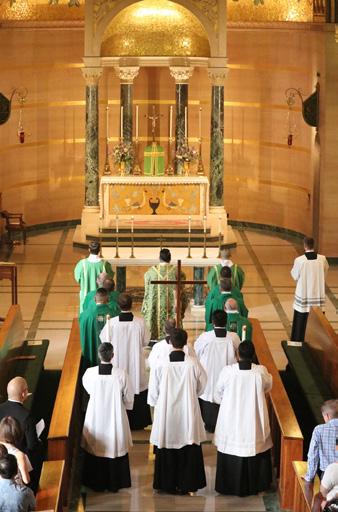
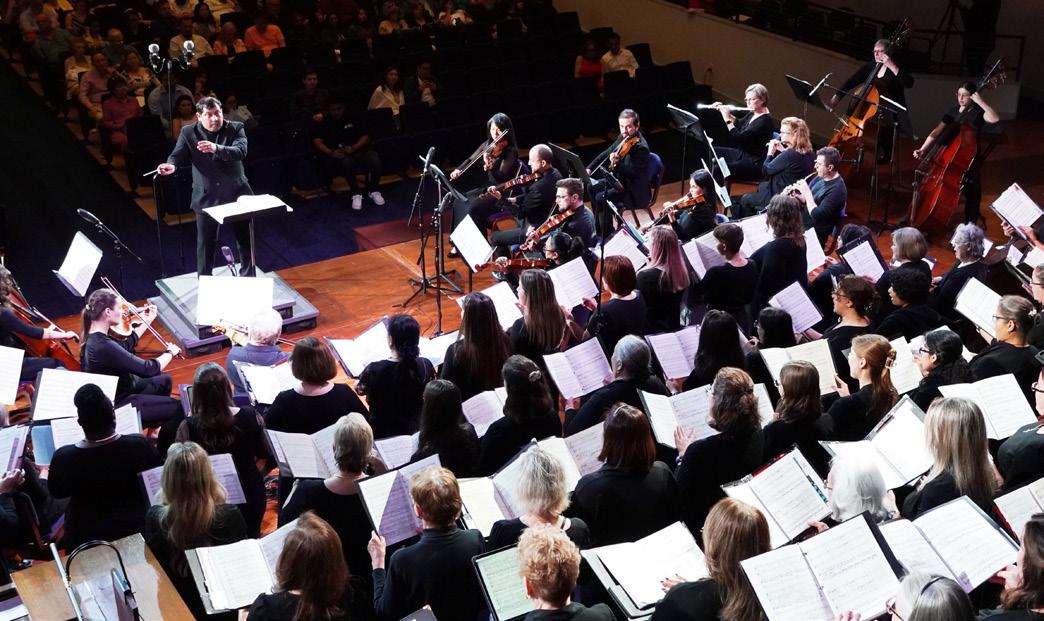
The second annual Sacred Music Choral Festival was held June 15 at The
communities in the
SPRING — In a resounding voice and sound comprised of 200 voices and a full orchestra 22 members strong, the second annual summer Sacred Music Choral Festival reached its crescendo at the Centrum at Cypress Creek Christian Community Center.
Under the direction of Gonzalo Ramos, the choir united a variety of voices and orchestral members for an ecumenical choral concert on June 15. Participants represented some 65 Catholic parishes and non-Catholic communities combined. This year, the concert featured the works of John Rutter’s Requiem.
“The goal of this program is to enrich the hearts and minds of our participants and listeners by offering a meaningful experience that is designed to build connections within our community through the art of sacred music,” Ramos said.“To see the smiles and positive attitudes from singers at each rehearsal was energizing. It was amazing, enlightening and great fun to collaborate with superb soloists, choristers and orchestra members.”
“Preparing an ecumenical choir featuring 150-plus choristers from the greater Houston area has been a true joy and an enriching experience,” he said.
Next year, the third annual summer Sacred Music Choral Festival is set for June 21 to 22 and will be held at the Wortham Theater Center in downtown Houston. The concert will feature the choral and orchestral work of Giuseppe Verdi.
To learn more, visit www.archgh.org/choralfestival. †

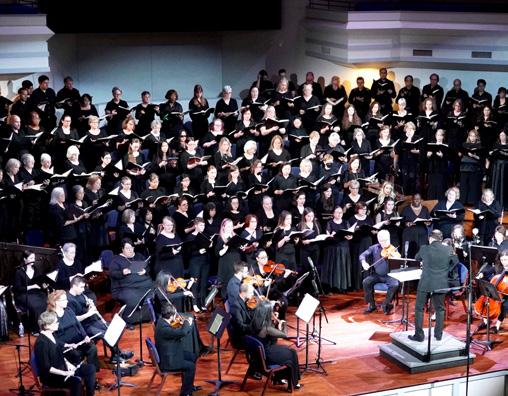
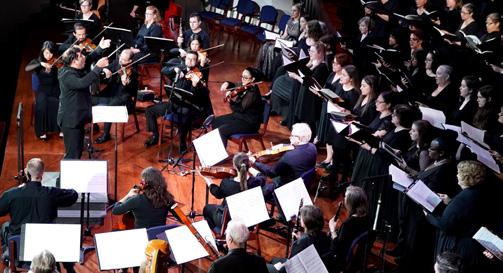
Effective July 1
Father Thomas E. Hawxhurst
Pastor - St. Andrew Parish, Channelview
Father Jorge Martinez, L.C.
Pastor - St. Patrick Parish, Houston

HOUSTON — The 2024 Wedding Anniversary Jubilee Masses honoring couples celebrating their Silver (25th) and Gold (50th) Anniversary of marriage in the Catholic Church are open for registration.
The Gold Anniversary Mass is set for Sunday, Sept. 22, at the Co-Cathedral of the Sacred Heart, located at 1111 St. Joseph Pkwy. in downtown Houston, at 3 p.m. Couples are eligible to receive a special recognition whether they attend the ceremony or not. The Silver Anniversary Mass is set for Sunday, Nov. 17, also at the Co-Cathedral of the Sacred Heart at 3 p.m.
Early registration, which ends July 22 for the 50th and July 19 for the 25th, is $25 per couple and includes an Archdiocesan certificate of each anniversary, a special issue worship aid and a commemorative pin. Registration increases to $40 per couple after those dates.
For more information and to register, visit www.archgh. org/offices-ministries/pastoral-educational-ministries/ family-life-ministry. †
Popular summer young adult speaker series continues through July
HOUSTON — Café Catholica, the annual young adult summer gathering presented by the Archdiocesan Office of Young Adult and Campus Ministry, is set for three more Mondays in July at St. Vincent de Paul Catholic Church, located at 6800 Buffalo Speedway in Houston. The theme for the summer series is “Home With Him.”
Open to young adults aged 18 to 39, Café Catholica offers opportunities to gather with nearly a thousand fellow young Catholics for Mass, dinner and talks. The event will be held July 15, 22 and 29. It begins at 5:15 p.m. with Confession, followed by Mass at 6:15 p.m., dinner at 7:15 p.m. and the keynote speaker at 8:15 p.m.
Keynote speakers include Catholic speakers Bob Lesnefsky and Kim Zember and Brian Lennox, director of Faith Formation from St. Faustina in Fulshear.
No registration is needed to attend. Donations are accepted. For more information, visit www.archgh.org/ cafecatholica or call 713-741-8778. †
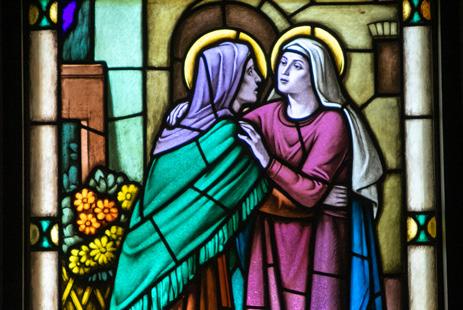

More than 100 Catholic students learn ‘fearless’ writing during summer camps Summer writing camps draw talented Catholic students ▪ SEE PAGE 18
EUCHARIST, from page 1
with His disciples in the upper room. I had often thought of the privilege enjoyed by those who were there that night. Then, while I was praying in the chapel one Thursday, it struck me: There is no difference. The Jesus who was in the upper room is the same Jesus who is in the chapel with me. The Church makes no distinction. He is fully present — body, blood, soul and divinity — in the monstrance. Yes, He is in His Eucharistic disguise, but He is one and the same Jesus, nevertheless.
As Pope Pius XII put it, “A Holy Hour of adoration testifies to the fact that the Jesus who died on the cross, is present in the Eucharist and reigns in heaven, are identical.”
This understanding constitutes the very heart of the Catholic faith, the distinctive dogma that sets us apart. It should be the treasure of every Catholic. Sadly, it is not. According to opinion surveys, which can vary widely, Catholic belief in the real presence of Jesus in the Eucharist is on the decline, with an average of only around half or fewer holding it to be true, which has prompted the recent National Eucharistic Revival that culminates with the National Eucharistic Congress this month in Indianapolis.
Much has been written about “cafeteria Catholics” who go down the church line and pick and choose what to believe and what to pass up. But not believing in the Real Presence isn’t the spiritual equivalent of choosing the apple pie over the cherry. The late Jesuit Father John Hardon, writing on the centrality of the real presence of Jesus in the Eucharist, stated: “If we believe this, we are Catholic. If we do not, we are not, no matter what people may think we are.”
If we lack physical strength or stamina, we can join a gym and begin working out. For those Catholics whose faith is weak in this area, I would recommend spending some time with Jesus in Eucharistic Adoration, even if you are among the doubters. Look upon it as a spiritual gym. I discovered that you can be theologically challenged and still reap great spiritual benefits from simply being in His presence one hour a week. Jesus meets us where we


With less than a month to go, more than 50,000 Catholics have registered for the National Eucharistic Congress, the pinnacle of the U.S. bishops’ National Eucharistic Revival.
Organizers expect the July 17 to 21 congress, held in Indianapolis, to be a watershed moment, igniting American Catholics’ belief in and devotion to Jesus’ real presence in the Eucharist. Hundreds are attending from the Archdiocese of Galveston-Houston, including Daniel Cardinal DiNardo, Auxiliary Bishop Italo Dell’Oro, CRS, and many lay faithful.
Follow live updates from the Congress in Indiana on social media and online at www.archgh.org/revival †
Jesus also is there to hear your petitions, but we should guard against making it all about ourselves. Keep the focus on Him and you can’t go wrong.
are. If we persist, He will deepen our understanding.
Two virtues that are especially needed by those beginning Eucharistic Adoration are humility and patience. Set aside all pride and preconceived notions. You are in the presence of the living Lord; conduct yourself accordingly.
The blessings I have received from Eucharistic Adoration are many and varied. Some I can define, and others remain more elusive, such as the growing sense that I am changing for the better in some important respects. I began to perceive this change only after I became involved in Adoration.
Pope Benedict XV called Eucharistic Adoration “the queen of all devotions,” a view shared by numerous popes and saints. However, the practice largely fell into disuse following Vatican II. No one is more closely identified with its revival than St. John Paul II.
Here are just a few of his observations
Our downtown location has temporarily relocated.
We are NOW OPEN at 2409 Austin Street
(two streets behind our San Jacinto Street building) We will re-open our main location as soon as possible. Order by phone or email 713-659-4709 or sacco@saccos.com
on the subject:
– “Jesus Himself is calling you to spend one special, specific hour with Him each week.”
– “The love of God and neighbor, the greatest commandment, is expressed in, and the fruit of, Eucharistic worship.”
– “Priestly, religious and missionary vocations will stem from your Holy Hour.”
The personal spiritual blessings that proceed from Eucharistic Adoration are rich and abundant.
Do you wish to deepen your prayer life? The same Jesus who taught His disciples how to pray is there to help you as well, and what better place to contemplate Jesus — the highest form of prayer — than in His presence?
The same holds true for Scripture reading. Jesus is the living word, and a finer tutor could not be imagined, as the two men who walked the road to Emmaus with him testified.
Praying the Rosary, meditating or simply resting in the quiet of His presence, Eucharistic Adoration enhances them all.

Father Hardon saw this practice as the centerpiece of devotion, saying that we “should build the whole edifice of our spiritual life around adoration.”
Of course, one does not need to be engaged in sacramental adoration to have access to Jesus. He is always available to those who come to Him in faith. But the Church teaches that the manifestation of Jesus in the Eucharist is “unique” and “in the fullest sense,” and therefore worthy of special devotion (CCC, No. 1374).
Just as His disciples were transformed by being in Jesus’ presence, it’s impossible to spend an hour with Him in Eucharistic Adoration and leave the same person we were when we walked in.
So consider giving it a try. If your parish has adoration, sign up to take a time slot. If the devotion is not in place, look into what can be done to obtain it. You have absolutely nothing to lose and a treasure trove of spiritual riches to gain.
I will give St. Teresa of Kolkata, a daily recipient of the Eucharist, the final word: “Adoration of the Blessed Sacrament is the best time you will spend on earth.” † – F. Douglas Kneibert writes for OSV News from Missouri.

(OSV News) — Father Benedict Groeschel, a founder of the Franciscan Friars of the Renewal, pointed out in his book “In the Presence of Our Lord: The History, Theology, and Psychology of Eucharistic Devotion” that there are “four kinds of prayer most appropriate in the presence of the Eucharist, namely adoration and praise, thanksgiving, repentance and trusting intercession.”
Sometimes it can be challening to imagine ways to fill an hour of prayer during private Eucharistic adoration, so here are suggestions for what to do during a holy hour:
1
Pray the Psalms or the Liturgy of the Hours. Whether you are praising, giving thanks, asking for forgiveness, or seeking an answer, you’ll find an appropriate psalm. The ancient prayer of the Church called the Liturgy of the Hours presents an excellent way to pray through the Book of Psalms throughout the year.
2Recite the “Jesus Prayer.” Say “Lord Jesus, have mercy on me, a sinner,” repeatedly as you quiet your heart and mind. Repeating the prayer can help draw your focus on the Eucharist even as distractions may bubble up.
3

(USCCB) – The importance of Eucharistic Adoration is shown in the fact that the Church has a ritual that regulates it: the Rite of Eucharistic Exposition and Benediction.
This is an extension of the adoration of the Blessed Sacrament which occurs in every Mass: “Behold the Lamb of God, behold him who takes away the sins of the world. Blessed are those called to the supper of the Lamb.” Exposition of the Blessed Sacrament flows from the sacrifice of the Mass and serves to deepen our hunger for Communion with Christ and the rest of the Church. The Rite concludes with the ordained minister blessing the faithful with the Blessed Sacrament.
Holy hours are the Roman Catholic devotional tradition of spending an hour in Eucharistic Adoration in the presence of the Blessed Sacrament.
There are variety of holy hours that focus our prayer to Jesus Christ on peace, life, vocations, and other topics that are at the heart of the life of the Church and the world. †
that you are in His presence, and tell Him all that comes to your mind. Listen for His response. Pray the prayer that St. Francis instructed his brothers to pray whenever they were before the Blessed Sacrament: “I adore You, O Christ, present here and in all the churches of the world, for by Your holy cross You have redeemed the world.”
6Ask for forgiveness and intercede for others. Think of those who have hurt you and request a special blessing for them. Ask God to forgive you for all the times you have neglected or hurt someone else. Bring before the Blessed Sacrament all those who have asked you to pray for them. Ask the Lord to address their concerns.
7Pray the Rosary. St. John Paul II reminds us, “is not the enraptured gaze of Mary as she contemplated the face of the newborn Christ and cradled Him in her arms that unparalleled model of love which should inspire us every time we receive Eucharistic communion?” Ask Mary to join you as you gaze on Christ in the Eucharist and as you pray the Rosary.
4Read the life of a saint and pray with him or her. Most holy men and women have had a great devotion to Our Lord in the Eucharist. Therese of Lisieux, Catherine of Siena, Francis of Assisi,
Meditate with Scripture. Choose a passage from the Bible. Read the words and ask God to let the passage speak to you. Pay special attention to anything that strikes you and ask God what He wishes for you to draw from that passage.




Thomas Aquinas, Peter Julian Eymard, Dorothy Day, Mother Teresa of Kolkata and Baroness Catherine de Hueck are just a few. Read about them and pray their prayers before the Blessed Sacrament.
5Pour out your heart to Christ and adore Him. Speak to Jesus, aware
8
Sit quietly and just “be” in the presence of God. Think of a visit to the Blessed Sacrament as coming to see your best friend. Sit quietly and enjoy being in each other’s company. Instead of talking to the Lord, try listening to what He wants to tell you. †
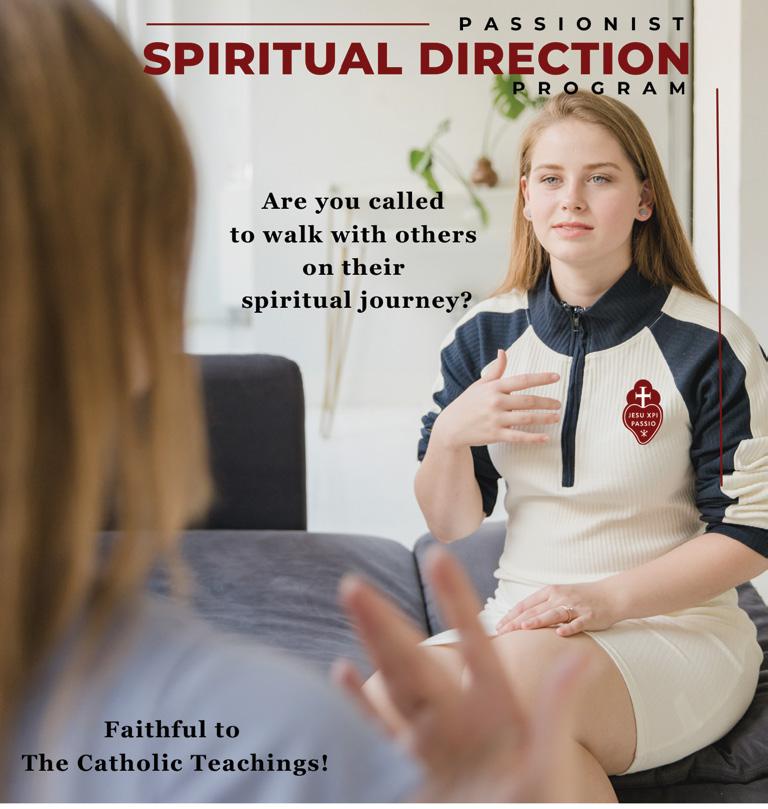

BY JONAH DYCUS Texas Catholic Herald
HOUSTON — Hundreds of local Catholics gathered in faith and fellowship for the June 21 Archdiocesan Prayer Breakfast at the Hilton AmericasHouston in downtown Houston.
The speaker for the event was George Weigel, a Distinguished Senior Fellow of the Ethics and Public Policy Center, a Catholic theologian and St. John Paul II’s American biographer.
In his welcoming comments to those in attendance, Daniel Cardinal DiNardo reflected on the reasons for hosting the annual prayer breakfast — community and formation.
“The community aspect is evident,” Cardinal DiNardo said.“This morning, we have gathered from every corner of this local Church. We represent nearly every socioeconomic and ethnic demographic in what is truly the most diverse city in the United States. And yet, with all these differences, we are united in one faith. In fact, it’s why I love Houston so much … it’s one Catholic faith, and it’s practiced well.”
component of the Prayer Breakfast, “we welcome leading thinkers, speakers, theologians and public figures, and we are reaffirmed in our desire to integrate our faith and our daily life,” Cardinal DiNardo said. “This gathering acknowledges the need for all persons to
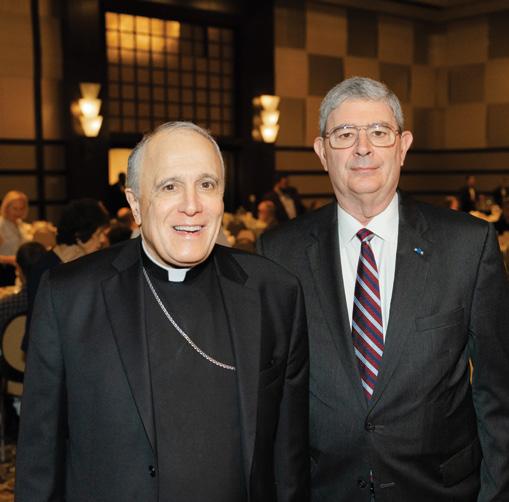
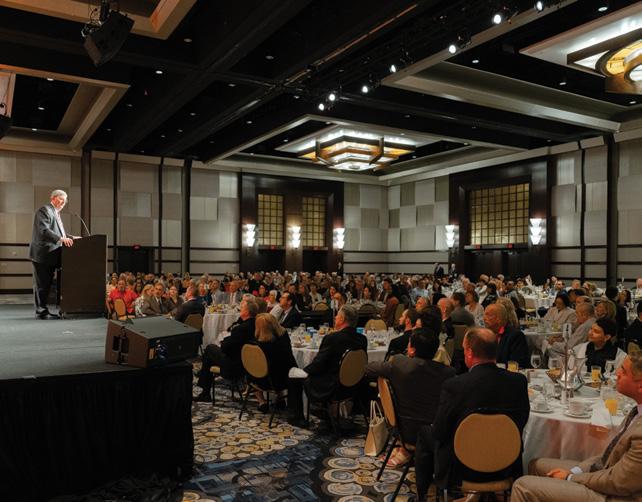




BY BRIAN GARCIA-LUENSE
How to balance one’s commitments as a baptized Christian disciple of Jesus Christ with the demands of citizenship has been a concern of the Christian community from the very beginnings of Christianity. Jesus Himself, answering to a controversy designed to trap Him, declares that we are to “Render to Caesar what belongs to Caesar, and to God what belongs to God.” St. Paul takes up this question in his own writings, notably in his letter to the Romans. As we approach national elections in this country this fall, it is an inescapable question for us as well.
Last year the U.S. bishops issued an updated version of their document Forming Consciences for Faithful Citizenship. The full text of the document, in English and Spanish, can be found for free on the USCCB website (www.usccb.org/resources/formingconsciences-faithful-citizenship-pdf).
While I seek to highlight some key points here, nothing can replace a careful reading of the text itself.
First and foremost, “we bishops do not intend to tell Catholics for whom or against whom to vote” (no. 7). Rather, the bishops seek to lay out fundamental moral principles that Catholics must use to form their consciences. Our conscience is a judgment of reason about what is morally good in a concrete moral situation. “Conscience is not something that allows us to justify doing

whatever we want, nor is it a mere “feeling” about what we should or should not do. Rather, conscience is the voice of God resounding in the human heart, revealing the truth to us and calling us to do what is good while shunning what is evil” (no. 17). Thus, the judgment must be informed by the truth if it is to be made correctly. The bishops identify four key themes that must be considered when forming one’s conscience: The Dignity of the Human Person, Subsidiarity, The Common Good and Solidarity.
As followers of Jesus Christ, we believe that human life is sacred and everyone enjoys a special dignity simply because of being human. This fundamental principle has far-reaching implications. Issues like abortion, euthanasia, assisted suicide, human cloning, in vitro fertilization and the destruction of human embryos for research are all examples of instances in which people are treated as mere objects
and human life is not regarded as a precious gift over which we are stewards but not owners. Racism and human trafficking likewise treat individuals as objects and fail to respect people’s dignity. Poverty and suffering are also an affront to human dignity, and therefore, Catholics are called to work to overcome them as well.
Even in an age of terrorism, not every avenue to combat terrorism is open to us as disciples of Christ. Recognizing the common humanity, even of those who would seek to dehumanize others, leads us as Catholics to condemn all forms of torture, unjust war, the indiscriminate use of drones for violent purposes, genocide, and attacks against noncombatants.
The bishops define subsidiarity by stating that “larger institutions in society should not overwhelm or interfere with smaller or local institutions, yet larger institutions have essential responsibilities when the more local institutions cannot adequately protect human dignity, meet human needs and advance the common good” (no. 48).
To some extent this principle is enshrined in our country’s system of federalism, in which the national government is supposed to deal only with those issues that cannot effectively be handled at the state level. The principle would also indicate that local governments should be allowed by states to handle those things that they can do effectively. Perhaps less obviously, the

A polarized Church. A divided nation. Pope Francis calls for “a better kind of politics.” How will you respond?
As Catholics, we take to heart Jesus’ invitation to follow the example of the Good Samaritan, who challenges us to “become neighbors to all” (#80). As a Church and a nation, we are polarized and divided. But as Pope Francis writes in Fratelli Tutti, we can seek “a better kind of politics, one truly at the service of the common good” (# 154). We can see ourselves as members of one family. We can seek to encounter and to grow. We can identify common values. We can listen to understand. We can seek the truth together. We can jointly come up with creative solutions to the problems that face our world.
principle of subsidiarity also indicates that families are the principal building blocks of society and that government policy should support and strengthen
Join us by taking the pledge and finding resources at www.civilizeit.org. † See CITIZENSHIP, page 8
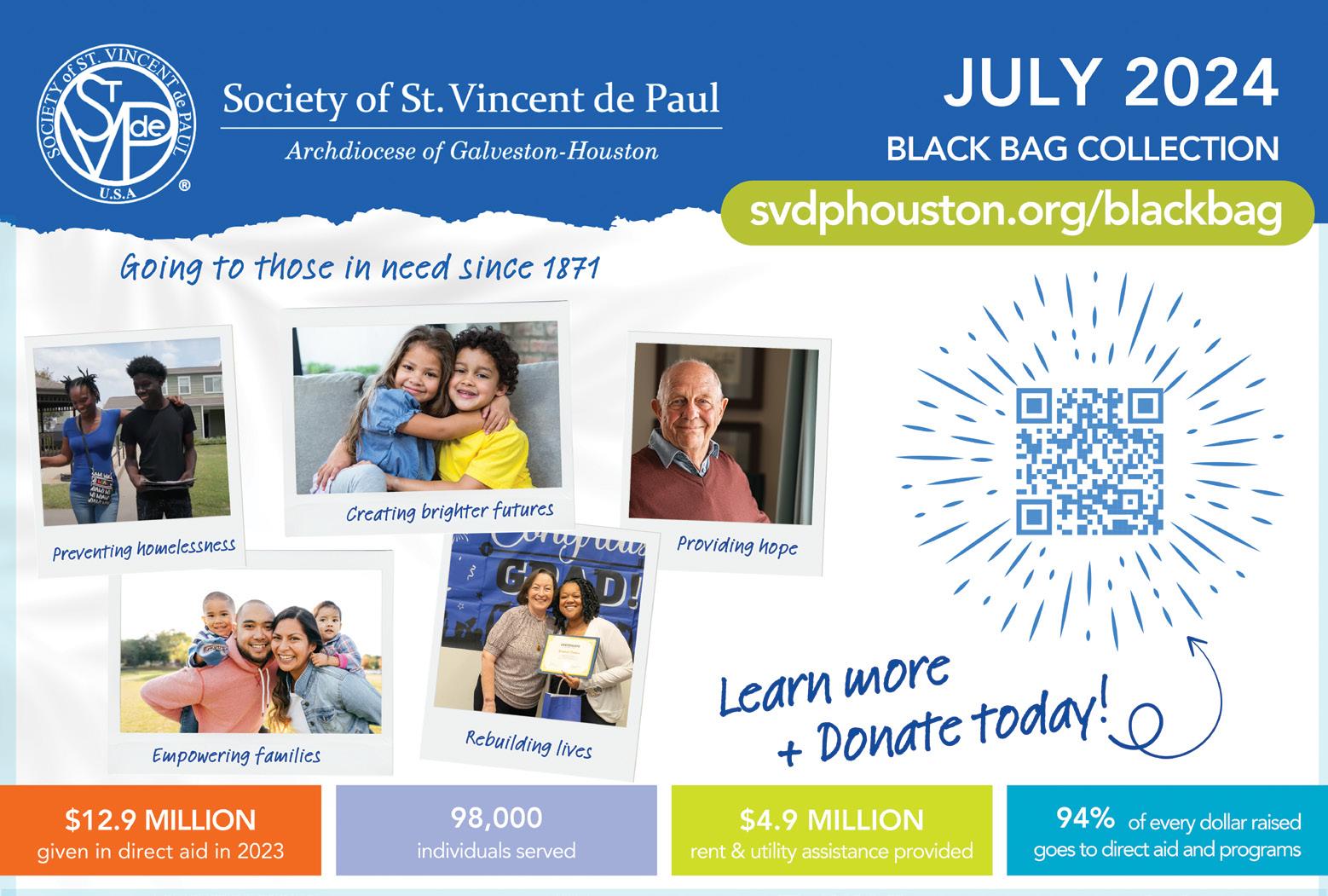

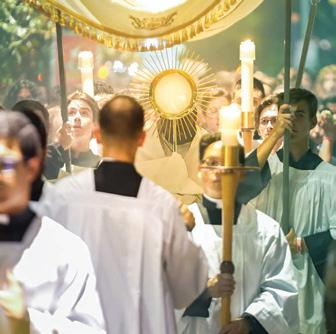
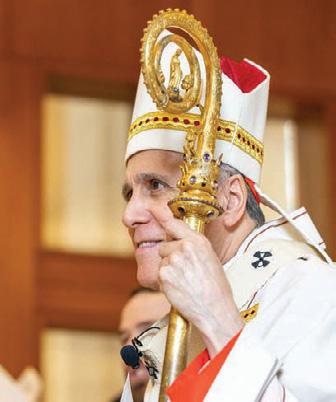


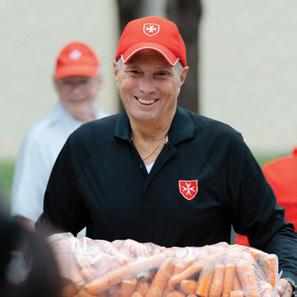
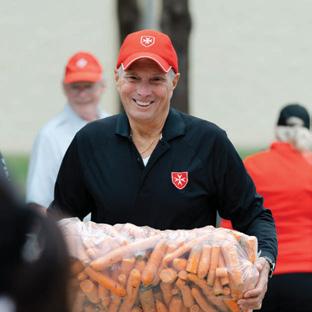
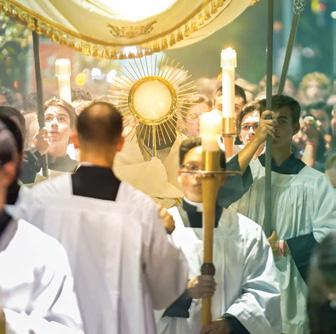

CITIZENSHIP, from page 7
families, not redefine, undermine, or distort them.
The common good is the idea that societies need to account for all their members. Within this principle, we see that human rights need to be protected. These fundamental human rights include the right to life and a right to access those things required for human decency — food and shelter, education and employment, health care and housing, freedom of religion and family.
Also included in this is the idea that the “economy must serve people, not the other way around” (no. 50).
Workers’ rights need to be preserved, including the right to a living wage. Finally, the idea of the common good also includes the idea that we have a duty to care for the environment, which is our common home.
Lastly, the principle of solidarity indicates that we are all connected to one another and that each of us has a responsibility for the well-being of everyone. “We are one human family, whatever our national, racial, ethnic, economic and ideological differences. We are our brothers’ and sisters’ keepers, wherever they may be” (no. 52). We do well to remember that in answer to the question, “And who is my neighbor?” Jesus told the parable of the Good Samaritan. This idea of solidarity also has implications regarding the question of immigration.
The bishops explicitly state, “Solidarity also includes the scriptural call to welcome the stranger among us — including immigrants seeking work — by ensuring that they have opportunities for a safe home, education for their children and a decent life for their families and by ending the practice of separating families through deportation” (no. 52).
Also included in this principle is the idea that the poor and marginalized, precisely because they are less able to help and advocate for themselves, have a special claim to our energy and attention. This is what is often called the “preferential option for the poor.”
Having laid out these fundamental principles, it is up to each individual to determine the best means to realize these values. “Although choices about how best to respond to these … are matters for principled debate and decision, this does not make them optional concerns or permit Catholics to dismiss or ignore Church teaching on these important issues” (no. 29).
Put another way, principled Catholics of good will might disagree on what policies will best realize these goals, but they cannot lay aside the issues or decide that they are not necessary to pursue. †
Brian Garcia-Luense is an associate director of the Office of Evangelization and Catechesis.

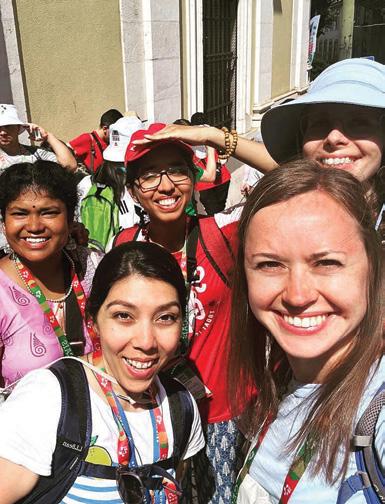
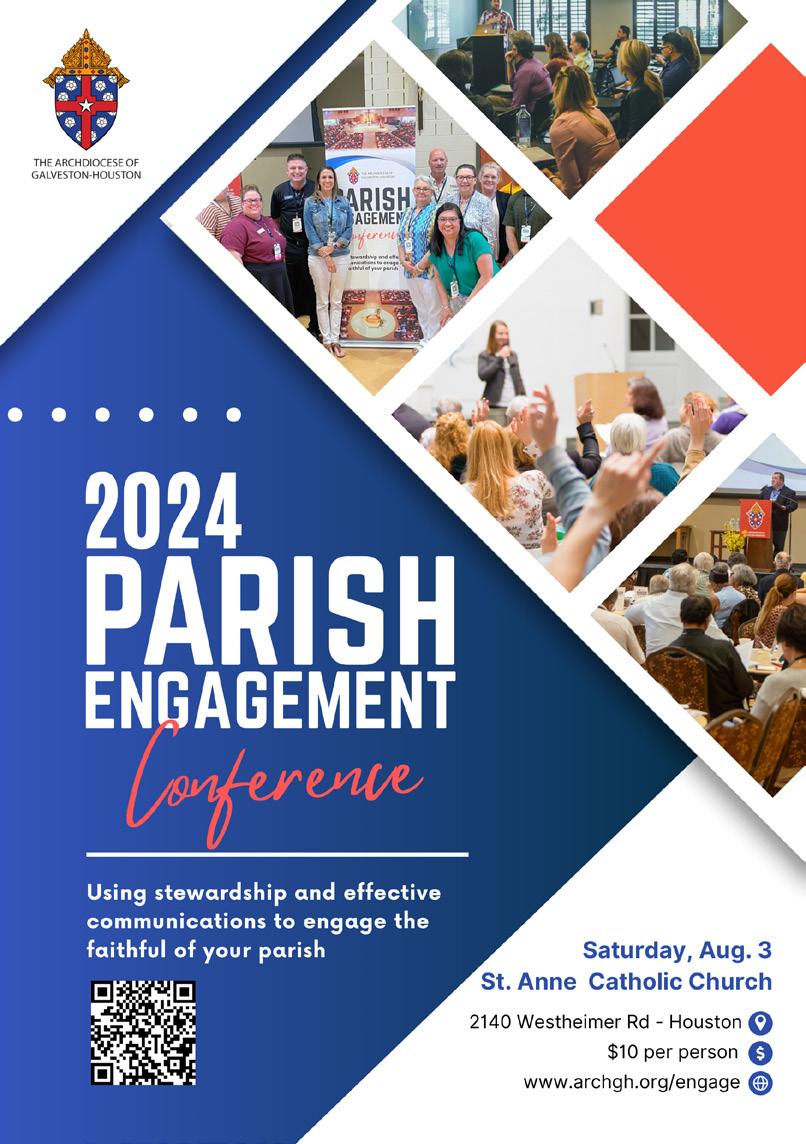
BY KERRY MCGUIRE Herald Correspondent
HOUSTON — The spirit of compassion and care of Jesus shines brightly in the hearts of those serving at St. Dominic Village, located in the Texas Medical Center. For volunteer and retiree John McConn, this ministry transcends mere community service or a way to pass the time — it represents a deeply personal spiritual journey shaped by his Catholic upbringing as one of nine children raised by faith-filled parents and educated in several Catholic schools across Houston.
McConn’s connection to St. Dominic Village, Houston’s sole Catholic senior living community, began in the 1970s when his aunt resided there, a place frequently visited by his family. His father, a doctor with patients at the facility, further nurtured a strong connection with the community and Dominican priests.
McConn currently serves as an extraordinary minister of Holy Communion (EMHC) each Friday to residents in rehabilitation and nursing care at St. Dominic Village — a role he finds deeply fulfilling and the highlight of his week.
“You can feel Christ’s love when you enter those rooms,” McConn said. “The residents light up with smiles when they recognize you and show a deep thirst for the Eucharist. They think I am doing them such a favor, but I always tell them, ‘You are a blessing to me!’”
When McConn first began volunteering last year, he had a special moment when he encountered Father James Gaunt, C.S.B, his former chemistry teacher from St. Thomas High School in the 1960s, in the priest’s residence.
“When I walked into the room and recognized him, I said, ‘Father Gaunt,

The 2024 Diocesan Services Fund theme is “We are the Lord’s.” DSF operates in the Archdiocese of Galveston-Houston each year to help the Church carry out the ministries of teaching and sanctifying. DSF brings the needed financial resources to carry out 64 ministries.
DSF IN ACTION
This new video series brings to life the ministry featured in this story. Hear from people personally impacted by God’s grace through these DSF ministries.

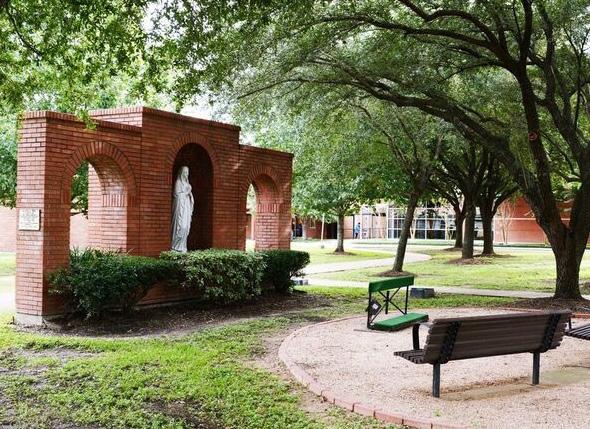
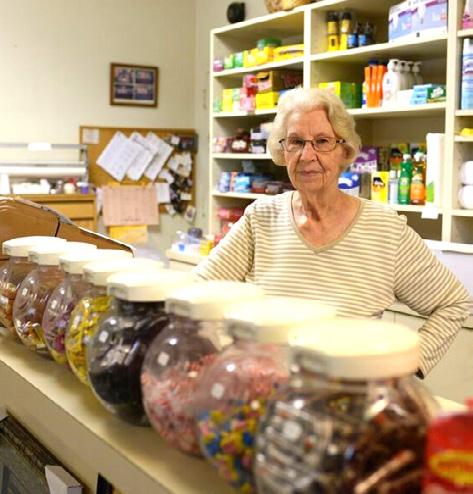
I hope you remember me. I’m Johnny McConn, and I took your chemistry class; I’ve always admired you as a teacher,’” McConn said. “That gave Father a smile. I sat and talked to him for a while, and although he couldn’t verbally respond to me, he spoke to me through his eyes.”
During some of his visits, McConn has witnessed the pain and suffering of residents who are extremely ill, which makes his role more meaningful. Before leaving, he reminds them that Jesus loves them very much, a gesture that often lights up their faces with joy and gratitude.
“My main takeaway from this experience is that I’m healthy, and I need to use some of the gifts God has given me,” McConn said. “It’s really all about love, and God made us for community and serving others.”
John Connolly, CEO of St. Dominic Village since November 2023 and a board member since 2014, oversees the dedicated staff and volunteers like McConn, who are committed to enhancing the lives of its residents. Under Connolly’s leadership, the ministry prioritizes residents’ wellbeing, ensuring that every decision reflects Catholic values and enriches their daily lives.
“The Catholic Church calls us to serve, to assist those less fortunate than us,” Connolly said. “At St. Dominic Village, we fulfill this calling primarily for those unable to care for themselves due to illness. Being present and engaging with these elderly individuals, some of whom may not receive weekly visitors, is profoundly meaningful.”
St. Dominic Village, supported by the Archdiocese’s Diocesan Services Fund (DSF), provides a wide range of care, including independent and assisted living and skilled nursing for long-term and short-term rehabilitation. Its fivestar-rated center is among Houston’s few, showing its commitment to excellence. The community also consists of the Archbishop Fiorenza Residence for up to 25 retired priests and spiritual enrichment programs and sacramental celebrations at the Warren Chapel, which seats over 200 people and sees 50 to 60 residents attending daily Mass.
Connolly said contributing to the annual DSF appeal is crucial for supporting St. Dominic Village’s mission. Connolly also envisions St. Dominic Village as a place where volunteers serve in numerous roles on campus, making a meaningful impact by utilizing their unique talents and gifts.
“We need volunteers to help with activities for the seniors or serving at Mass,” said Connolly. “Whether you play piano or guitar, enjoy calling Bingo, or aspire to become an EMHC, there are plentiful opportunities available here at St. Dominic Village. Our campus welcomes volunteers to engage with the residents in several ways.”
Connolly said he often receives gratitude from volunteers who appreciate the chance to serve the seniors. Retired priests thank him for improvements in their food and quality
of life, and residents often take him by the hand to say they are praying for him daily. This appreciation from the community highlights the profound impact of the ministry and the vital role of the staff and volunteers who tirelessly maintain the supportive, loving environment at St. Dominic Village.
To learn more about volunteering or programs and services offered at St. Dominic Village, go to www. archgh.org/stdominicvillage.
To donate to the Archdiocese of Galveston-Houston’s DSF annual appeal, go to archgh.org/ DSF. The DSF supports 64 ministries, whether direct service or education, which require this critical funding to remain in operation.
Out of each gift given to DSF, 100% of every dollar goes directly to supporting these ministries. †
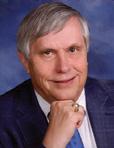

Sister Susanne Ruane, CCVI
HOUSTON — Sister Susanne Ruane, CCVI, died on Thursday, May 30. She was 86 years old.
A funeral Mass was held June 14 at the Immaculate Conception Chapel, Villa de Matel. Interment is in the Villa de Matel Cemetery. †
Deacon Henry Felix Vinklarek Jr.
SPRING — Deacon Henry Felix Vinklarek Jr., who served at St. Ignatius of Loyola in Spring, died Monday, June 24. He was 73 years old.
A funeral Mass was held July 3 at St. Ignatius of Loyola in Spring. Interment is in Oak Hill Cemetery in Smithville. †
Pray for the following priests whose anniversaries of death are during the month of August.
Aug. 1, 1993 Rev. John B. Mullins, CSB
Aug. 3, 1999 Rev. John A. Weihrer
Aug. 4, 1985 Rev. James P. Courneen, MM
Aug. 4, 1995 Rev. John A. Burke, CSB
Aug. 7, 2001 Rev. Msgr. George A. Beck
Aug. 8, 1943 Rev. Thomas F. Hogan
Aug. 8, 1969 Rev. John M. Cody
Aug. 8, 2006 Rev. William J. Young, CSB
Aug. 9. 1895 Rev. Joseph Querat
Aug. 9, 2014 Rev. Franklin Simmons
Aug. 10, 1856 Rev Jean-MauriceVerdet, OMI
Aug. 10, 1979 Rev. Joseph P. Walsh
Aug. 11, 1997 Rev. Ernest P. Magee, CSB
Aug. 12, 2013 Msgr. David W. Kennedy
Aug. 13, 1844 Rev. J.M. Paquin, CM
Aug. 15, 1931 Rev. Thomas J. Finn
Aug. 15, 1970 Rev. Francis J. Klass
Aug. 15, 1990 Rev. Timothy Curry, OP
Aug. 16, 2012 Rev. Anselm Walker
Aug. 17, 2013 Rev. Joseph A. Gietl
Aug. 17, 2013 Msgr. Charles C. Domec
Aug. 17, 2014 Rev. Jacques Weber, S.J.
Aug. 18, 2020 Rev. Elias Dorion
Aug. 19, 2017 Rev. Donald Bahlinger, SJ
Aug. 20, 1970 Rev. George F. Laurenson
Aug. 21, 1998 Rev. Stanley Guzik, OMI
Aug. 21, 2001 Rev. John J. Connolly
Aug. 23, 1857 Rev. John Bottet
Aug. 23, 1947 Rev. George Berberich
Aug. 25, 2007 Rev. A. Peter Whitney
Aug. 25, 2015 Rev. William M. Pickard
Aug. 26, 1980 Rev. Michael Biondi, CSB
Aug. 26, 2003 Msgr. Elmer T. Quinters
Aug. 27, 2002 Rev. Norbert N. Clemens, CSB
Aug. 28, 1989 Msgr. Jack J. Davis
Aug. 30, 1986 Rev. Arthur Nichols
Aug. 30, 2003 Rev. Feliciano del Val
Aug. 31, 1867 Rev. A.M. Micouleau
Need to change your Texas Catholic Herald mailing address? Call 713-652-4444 or email TDIELI@ARCHGH.ORG for assistance.
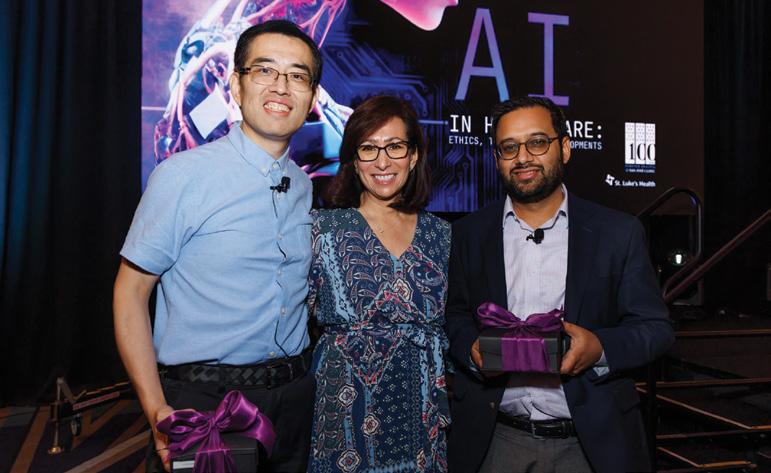
Dr. Muhammad Walji (right), professor and chair of the Department of Clinical and Health Informatics at UTHealth McWilliams School of Biomedical Informatics, and Dr. Xiaoqian Jiang (left), associate vice president of Medical AI at UTHealth’s Department of Health Data Science and Artificial Intelligence spoke at San José Clinic’s 12th Annual Spring Speaker Series Luncheon. Themed “Artificial Intelligence in Healthcare: Ethics, Trends, and Developments,” the event took place May 14 at the Marriott Marquis Houston in downtown. The two speakers, pictured with Margo Melchor-Hernandez, president and chief executive officer of the San José Clinic, provided insights into developments, trends and ethical considerations regarding artificial intelligence in healthcare.
Please pray for all victims of violence everywhere and their families. Pray for those being executed in Texas and their families:
August 7: Arthur Burton

Three decades of making a difference: Summer enrichment program celebrates 30 years of excellence, wisdom and creativity
HOUSTON — Celebrating 30 years in the Archdiocese, rising third through sixth graders from local Catholic schools were given the opportunity to spend three weeks over the summer in an intensive academic enrichment program at The DeBusk Enrichment Center for Academically Talented Scholars (DECATS Houston), offered through a grant from the DeBusk Foundation. The program is centered in Catholic teachings and follows the example of Christ.
An “Exploration Awaits” space theme guided students through engaging courses in fine arts, performing arts, science, mathematics, language arts, history, team building and leadership. Core courses focus on manners, self-organization, time management, wellness or values and morals, according to grade level. Students, called scholars, choose from a variety of course electives, including History’s Mysteries, Kitchen Chemistry, Get Growing, DECATS Dream House, Improv Your Day, Sew
Cool and more. Upper level scholars also organized service projects.
The summer enrichment program began to operate locally in the summer of 1995 with 40 scholars and eight faculty.

Thirty years later, the program operates at three host campuses: Strake Jesuit College Preparatory, St. Anne Catholic School in Tomball and for the first time, Incarnate Word Academy in downtown Houston.
The program now has 800 scholars and 120 faculty, staff and administrators.
Since 1994, more than 8,700 attendees have been through the program, following the motto “Better at does not mean better than.”
The DeBusk Foundation created in 1979 in the Dallas area by Manuel and Edith DeBusk with the goal to enrich gifted and talented scholars.
From there, the program has grown and spread across Texas. For more information, visit www. debuskfoundation.org or www.decats. org. †
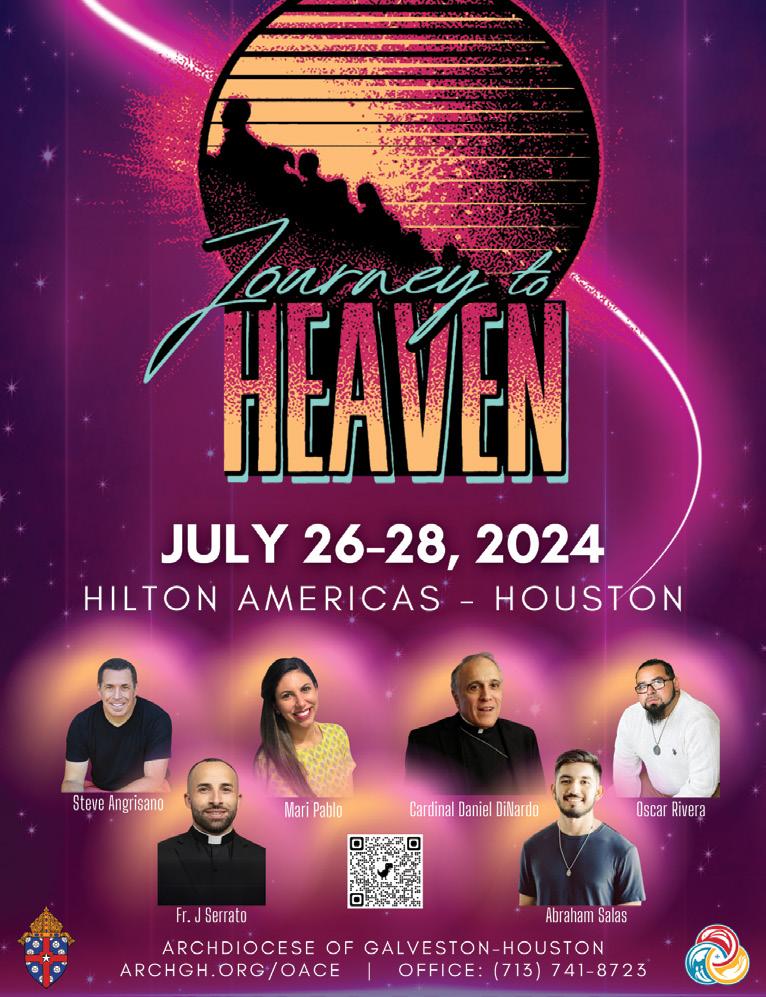


in the Making” explore what captivated Generation X by playing vintage video games from the 1980s. Next, the course allowed them the opportunity to design their own video games. At left, scholars in the “Game of Kings” course learn strategies and critical thinking skills while honing their skills on the chess board.


‘If the Son sets you free, you will be free indeed’ by
As a country, we recently celebrated Independence Day on July 4, which commemorates the passage of the Declaration of Independence by the Continental Congress on July 4, 1776. Through the Declaration of Independence, the 12 British colonies resolved that “these United colonies are, and of right ought to be free and independent States” from the rule of Great Britain.
The document asserted that “all Men are created equal,” but it would take nearly a century before that refrain could begin the process of actualization.
The U.S. would battle with an identity crisis, seesawing between what it professed on paper and what it proclaimed through its actions. On Sept. 22, 1862, Abraham Lincoln issued the Emancipation Proclamation, pronouncing that all enslaved individuals “henceforward shall be free.” It would take three more years for word to travel to Texas.
On June 19, 1865, nearly 2,000 Union Troops arrived in Galveston Bay, Texas, and announced that enslaved Black were free. This day became known as “Juneteenth” by African Americans in Texas and Louisiana, our country’s second Independence Day, which was recognized as a Federal Holiday in 2021.
Institutionalized racism against African Americans extended beyond the founding fathers and into Mother Church. Not only did some priestly orders participate in the enslavement of free human beings, but Black Catholics were also rejected by fellow Catholics and not permitted to worship alongside White Catholics. When Black Catholics were allowed to attend Mass with White Catholics, they were denied access to the precious Body and Blood or were required to sit in the back of the Church and receive communion last.
This painful history prompts the question: What does a Black Catholic know of freedom? The Catechism of the Catholic Church, citing Scripture, teaches: “For Christ has set us free.” In Him, we have communion with the “truth that makes us free.”The Holy Spirit has been given to us and, as the apostle teaches, “Where the Spirit of the Lord is, there is freedom.” (CCC 1741).
As Catholics, we embody this teaching every time we gather for the Mass. In Catholic parishes established to serve African Americans, the unbridled movement of the Holy Spirit is on full display every Sunday. The Spirit presents itself in harmonious
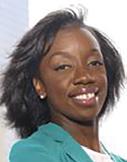
STACY ALLEN BARROW
choirs signing selections from the Lead Me, Guide Me hymnal, in the clapping of hands and tapping of feet, and in the shouts of “Amen,” and “Preach.”
The words of Servant of God Sister Thea Bowman encapsulate these liberative faith expressions: “While the world is full of hate, strife, vengeance, we sing songs of love, laughter, worship, wisdom, justice and peace because we are free… no man can enslave us.”
From the margins, Black Catholics have cultivated an unshakable, though tested, fidelity to the Catholic faith. To paraphrase the late Nobel Peace Prize awardee, Toni Morrison, Black Catholics “stood at the margins of Catholicism… and claimed it as central.” Catholics of African Descent rejoice in an unbound freedom not given by man but bestowed upon us by God.
The beauty of freedom is that it cannot be contained. In fact, freedom offers an opportunity to liberate not just the oppressed but also the oppressor. Through the power of the Holy Spirit, freedom challenges the status quo and grants us the opportunity to reimagine what is possible or even necessary.
We can expand what is considered normative by including historically marginalized Catholic expressions of faith in our liturgical routines.
Consider attending Mass once a quarter at a parish that centers a cultural community unlike your own, attend events sponsored by the Young Adult Catholics of African-Descent, the Catholic Youth of African Descent and other organizations in the Black apostolate, utilize images of Black Saints in your parish spaces and curriculums, incorporate hymns by Black Catholic composers into the liturgy, and even consider occasionally utilizing The Sound of My People by M. Roger Holland II as a Mass setting.
“Human freedom is a force for growth and maturity in truth and goodness; it attains its perfection when directed toward God, our beatitude.” (CCC 1731). May we experience true freedom offered through the love of God and neighbor. †
Stacy Allen Barrow is a member of Young Adult Catholics of African Descent.
The official website of the Archdiocese of Galveston-Houston includes this mission statement: “We are a multicultural Church of 1.7 million members from every continent of the world that prays and celebrates in over 14 languages in 146 parishes. We practice social justice and support the good works of persons in other countries. We do all of this in the name of our Lord, Jesus Christ.”
One way the Archdiocese supports good works internationally is through the annual Mission Cooperative Plan. Beginning each summer, the head of each diocese invites over 40 representatives of Catholic missionary organizations to visit the parishes, speak about their efforts, and invite parishioners to pray for and contribute to the work of the Church worldwide.
The Mission Cooperative Plan is coordinated through the Archdiocesan Mission Office, whose two-fold purpose is to create awareness and to encourage prayer and financial support for the mission efforts of the Catholic Church.
The Handmaids of the Holy Child Jesus are one of the congregations that

JULY 21
JULY
AUG. 4
AUG.
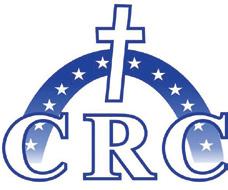

by HILDA OCHOA
will present this year.
This congregation of women, headquartered in the diocese of Ikot Ekpene, Nigeria, has members serving in seven African countries, as well as in Italy, Germany, England, Canada, Grenada and the U.S., specifically in Houston.
The history of the Handmaids is inspiring. It reflects the important role that Irish Catholics played in the development of the Catholic Church in Africa. In 1923, Bishop Joseph Shanahan of the Congregation of the Holy Spirit invited Irish Sister of Charity Mother Mary Charles Magdalen Walker to Nigeria. Her work primarily focused on the education of women. When four of her students expressed a desire to join her, the Congregation of the Handmaids of the Holy Child Jesus was launched.
The extensive reach of the Handmaids shows how the faith,
determination and dedication of the founding members influenced vast numbers to join and begin projects in new locations. To Ghana, Cameroon, Togo, Sierra Leone, Kenya, and Tanzania, the sisters traveled, developing programs to “uplift the standard of living for the people.”
The challenges facing the Catholic Churches and schools in these countries are not usually featured on local new reports. High percentages of poverty and increased violence continue to plague many dioceses. In February of 2024, the Nigerian bishops declared that there was a serious deteriorating situation in the economy and security of the nation. The stories shared through the Mission Cooperative Plan representatives are important for increasing understanding and collaboration.
Another group included in the Archdiocese Mission Cooperative Plan is the Sisters of Charity of the Incarnate Word. Founded in 1867, when three French sisters arrived in Galveston to open St. Mary’s Infirmary, the sisters have continued to develop remarkable
systems for healing ministry. In the U.S., they sponsor two of the largest systems for health care, CHRISTUS Health and Dignity Health. They support AIDS ministry in Houston, elderly care in Ireland, and primary care in Kenya, as well as programs for adult literacy, corporate responsibility and young adult outreach.
The motherhouse for the community is located just south of downtown Houston. Flying in front of the main building are the flags of the countries where the sisters are serving — El Salvador, Guatemala, Ireland, Kenya and the U.S. The beautiful building also houses the Ruah Center, offering retreats and spiritual direction.
Across the bottom page of the Archdiocese’s website is a phrase that captures the goal of the Mission Cooperative Plan: “Inviting all to become one in Christ.” Each parish’s generous response to missionary appeals will go a long way toward achieving that goal. †
Hilda Ochoa is the director of Mission Office of the Archdiocese.
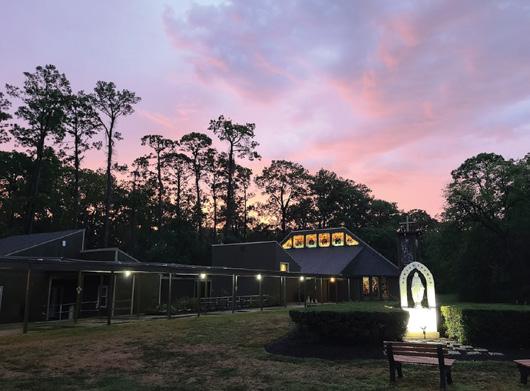
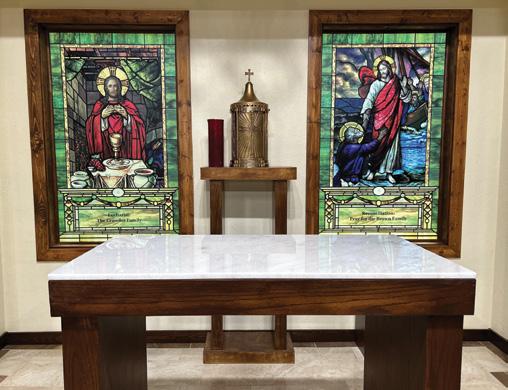


EL PASO (OSV News) — A state judge July 2 denied Texas Attorney General Ken Paxton’s effort to shut down Annunciation House in El Paso, Texas, a Catholic nonprofit serving migrants.
The ruling by Judge Francisco X. Dominguez of the District Court of El Paso County found that Paxton’s office “failed to establish probable grounds for the proceedings” and that the effort violated the Texas Religious Freedom Restoration Act.
“The record before this Court makes clear that the Texas attorney general’s use of the request to examine documents from Annunciation House was a pretext to justify its harassment of Annunciation House employees and the persons seeking refuge,” Dominguez ruled in granting Annunciation House’s application for relief.
“This Court previously expressed its concern that the attorney general did not identify what laws he believed were being violated from the outset,” the ruling said.
“There is no legal basis for closing a nonprofit that provides social services to refugees, period,” said Jerome Wesevich,
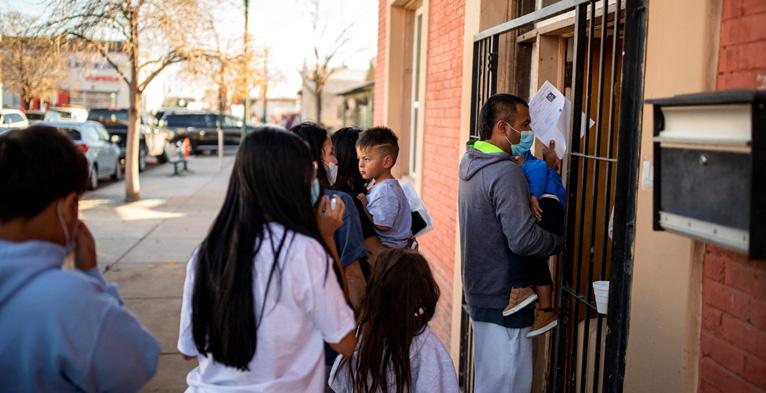
a lawyer for Texas RioGrande Legal Aid, which represents Annunciation House, during a post-ruling press conference July 2. He said the ministry “has always believed that the attorney general’s
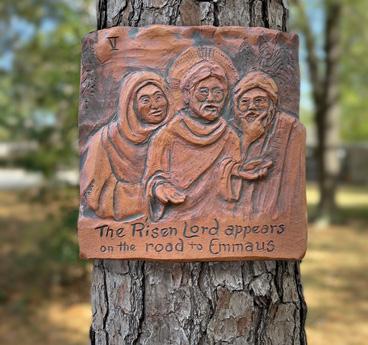
harassment of Annunciation House is morally and legally improper.”
“It’s not surprising that the court agreed with us on all of the grounds,” Wesevich said.
“This is a day of gratitude for El Paso, the work of Annunciation House and the resilience of our community’s hospitality workers,” Bishop Mark J. Seitz of the Diocese of El Paso said in a statement provided to OSV News
“This is also an important moment for religious freedom and a recognition of the important role that faith communities play in helping our nation lead with compassion and humanity in meeting the challenges of migration at the border,” the bishop said. “We look forward to continuing to work with our federal and state partners in identifying solutions to our broken system of immigration, working for reform and addressing the growing humanitarian crisis of deaths at the border.”
With respect to the Texas Religious Freedom Restoration Act, Wesevich stressed there were “many independent reasons for the court rejecting what the attorney general wanted to do.” But he said that particular law requires Texas to use the “least restrictive means” when it comes to any state action impacting an organization’s religious mission.
Annunciation Houses and its volunteers have demonstrated “from the outset” that they are “an organization that practices the Catholic faith and its teaching to love one another, including strangers; no exception for refugees,” Wesevich said. “That is what Annunciation House does.”
“The attorney general is not allowed to just walk in say, ‘Oh, I have some unfounded allegations, and I’m going to use my unfounded allegations ... to take the most extreme step of closing Annunciation House,” he said. “That directly contravenes what the Texas Legislature has commanded to be a limit to the attorney general’s power.”
Paxton’s office did not immediately respond to OSV News’ request for comment.
In court filings and press statements,
his office alleged Annunciation House runs “stash houses,” facilitates illegal border crossings, conceals “illegally present aliens from law enforcement” and did not turn over documents in its investigation.
Annunciation House attorneys denied wrongdoing or illegal conduct and said Paxton’s office did not adhere to appropriate legal processes for requesting documents from them.
Paxton’s effort to shut down Annunciation House comes as some Republican lawmakers have grown increasingly hostile toward nongovernmental organizations, including Catholic ones, that provide resources such as food and shelter to migrants at the U.S.-Mexico border.
A February suit filed by Paxton previously sought to shut down Annunciation House, accusing it of “human smuggling,” in a move that was denounced by local elected officials and Catholic immigration advocates, including Bishop Seitz. In March, Dominguez issued an order blocking Paxton’s subpoena of Annunciation House, finding both that Paxton’s effort seemed politically motivated and that it must go through appropriate due process in the state court system.
In its filing, Paxton’s office sought to downplay the “religious component” of Annunciation House’s mission, arguing, “Instead, Annunciation House’s members appear to subscribe to a more Bohemian set of ‘seven commandments,’ including commandments to ‘visit’ people when ‘incarcerated’ and “care (for them) when they’re sick.”
However, those quotes come from a witness who appeared to be referring to what the Catholic Church calls the “seven corporal works of mercy,” according to a review of the document by OSV News
The case even caught the attention of Pope Francis, who criticized Paxton’s attempt to shut down Annunciation House, calling it “madness” during a recent interview with CBS News
In the pontiff’s first one-on-one interview with a U.S. broadcaster, CBS journalist and interviewer Norah O’Donnell asked, “The State of Texas is attempting to shut down a Catholic charity on the border with Mexico that offers undocumented migrants humanitarian assistance. What do you think of that?”
“That is madness. Sheer madness,” Pope Francis replied.
Annunciation House operates several shelters in the El Paso area, helping migrants and refugees with food, housing and other assistance, as well as providing information about how to fill out the required legal documents to seek asylum in the U.S.
Asked about the ruling’s impact on Annunciation House, Wesevich said, “The volunteers of Annunciation House have a lot of work to do and they just continue to do it. They can just do it with more peace than they had yesterday.”
Paxton is expected to appeal the ruling. †
of many steps’ to be taken, say
(OSV News) — A call by the U.S. surgeon general for health warning labels on social media marks “one of many steps that need to be taken” to reduce the digital environment’s risks to kids and youth, said one of the heads of a mental health campaign launched by the nation’s Catholic bishops.
In a June 17 opinion piece for The New York Times, Dr. Vivek H. Murthy, the U.S. surgeon general, urged the creation of congressionally approved advisories for social media — similar to those federally mandated since 1965 for tobacco products — saying that “our children’s well-being is at stake.”
Murthy, who in 2021 sounded an alarm on the state of mental health among U.S. teens, declared that “social media is associated with significant mental health harms for adolescents.”
“Adolescents who spend more than three hours a day on social media face double the risk of anxiety and depression symptoms, and the average daily use in this age group, as of the summer of 2023, was 4.8 hours,” wrote Murthy. “Additionally, nearly half of adolescents say social media makes them feel worse about their bodies.”
Archbishop Borys A. Gudziak of the Ukrainian Catholic Archeparchy of Philadelphia told OSV News the surgeon general’s alert should be welcomed, saying, “There is sufficient evidence that the uncontrolled use of social media can be detrimental to the psychological and spiritual health of susceptible individuals.”
The archbishop, who chairs the U.S. Conference of Catholic Bishops’ Committee on Domestic Justice and Human Development, teamed up last fall with Bishop Robert E. Barron of Winona-Rochester, Minnesota, head of the USCCB’s Committee on Laity, Marriage, Family Life, and Youth to launch the National Catholic Mental Health Campaign.
With a number of partner organizations — among them, Catholic Charities USA, the Catholic Health Association, the Association of Catholic Mental Health Ministers and the National Catholic Partnership on Disability — the national campaign is raising greater awareness of the issue, to remove the sense of stigma for those suffering from mental illness, and “to advocate a clear message to all: everyone who needs help should get help.”
At the same time, “I have few illusions that such a warning label will solve the problem,” said Archbishop Gudziak.
“It is evident that the development of our communications, media and information technology is advancing faster than our
capacity to ethically discern how to best use these powerful tools,” Archbishop Gudziak said, referencing recent remarks by Pope Francis to G7 leaders on artificial intelligence.
“These tools, instead of remaining mere instruments, can and already have become controlling mechanisms in many instances,” the archbishop added.
Murthy himself admitted that “a warning label would not, on its own, make social media safe for young people,” pointing to the need for federal regulation and regulatory compliance by social media companies.
Along with broad-based support from parents, peers and public health leaders, specific measures Murthy recommended include protecting young users from online harassment, abuse, exploitation, sexual content and extreme violence.
Murthy also said platforms should not be permitted to collect sensitive data from children, who should also be shielded from “push notifications, autoplay and infinite scroll, which prey on developing brains and contribute to excessive use.”
Yet making the digital world safer for kids and youth is akin to wielding a “double-edged sword,” licensed clinical psychologist James Black, director of the Youth Services Division at the Archdiocese of Philadelphia’s Catholic Social Services, told OSV News
Black pointed to the American Psychological Association’s caution that assessing the true impact of social media on young people can be complex, saying, “On the one hand, there are certainly positive aspects (to the platforms)” — such as providing connection among marginalized or physically distant groups — along with “downsides.”
“Correlation doesn’t mean causality,” Black said. “Is it social media that’s causing (distress), or do you have kids with a tendency towards depression and anxiety most negatively impacted by overuse of social media?”
Still, said Black, social media cannot substitute for authentic, in-person human interactions — and can instead obscure a user’s overall perspective.
“People put all the great things that are happening in their lives up on social media, and it can give you this distorted sense that everyone else’s life is great — they’re going on trips, they have lots of friends, they have all these beautiful cars — but that’s a very distorted portrayal of most people’s lives,” Black said. “Most people don’t put on Facebook the struggles they’re having, the money problems, or the fact that they got fired from their job last week.”
In youth, that imbalance is magnified,
Questions about subscription, circulation or need to change an address? Call 713-652-4444 or email TDIELI@ARCHGH.ORG for assistance. Visit ARCHGH.ORG/TCH for more information.
he said.
“Young people might see pictures of people their age with lots of friends or at parties, and then they say, ‘Well, why wasn’t I invited to that party? Why don’t I have lots of friends? ... But they may not know that half of the people in that picture fell out with each other the next day because you know somebody said something untoward at that party.”
Black also said that law enforcement is “really attuned now to monitoring social media pages,” especially to prevent teen violence — which can quickly escalate from online to in-person settings.
He said parents and caretakers are crucial in helping children and youth set boundaries with their social media use.
In fact, the surgeon general’s warning is in many respects “targeted for parents,” since “young people are going to be using social media, whether there’s a warning label or not,” said Father Thomas F. Dailey, an Oblate of St. Francis de Sales and professor of homiletics and social communication at St. Charles Borromeo Seminary in Wynnewood, Pennsylvania.
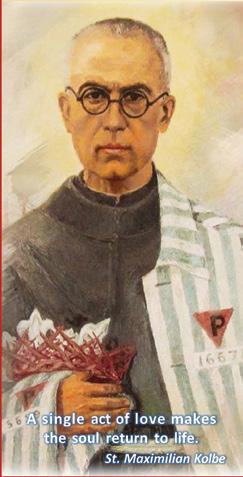
Father Dailey said that the term “social media” is “a broad one nowadays,” encompassing “networking media to electronic games to video. It’s not just Facebook.”
In all of those areas, he said, “the Church should certainly be present and pushing out a good message.”
“We preach ‘health’ in an even bigger sense than the surgeon general,” he told OSV News. “We talk about salvation. And our testimony, our witness is using (social media) for all the right reasons and in all the best ways — even though, or maybe because, there are problems with it. We have to be there in the midst of it with ... a corrective, with a positive message.”
The task is a daunting one, said Archbishop Gudziak — and the surgeon general’s call “should be welcomed” as one starting point.
“We face a difficult struggle for true human freedom and dignity,” said Archbishop Gudziak.“We need all the help we can get to be truly psychologically and spiritually free in a world increasingly dominated by social media and AI.” †
Saturday, July 13, 7 a.m. to 5:30 p.m. St. Anthony of Padua Catholic Church 7801 Bay Branch Dr., The Woodlands, Texas
Are you being called to serve in Prison Ministry?
Join Correctional Ministries of the Archdiocese of GalvestonHouston for a day of reflection, prayer, testimonies, and learn how you can serve the mission of Kolbe Prison Ministries. Featuring guest speaker Fr. Mitch Pacwa, S.J. and Daniel Cardinal DiNardo, Mass Celebrant.
Visit www.kolbeprisonministries.org for more information or to register.

VATICAN CITY (CNS) — Being obedient to God’s commandment and spirit of love can radically change attitudes and actions to convert people from “predators” of natural resources to “tillers” of God’s great garden of planet Earth, Pope Francis said.
“The earth is entrusted to our care, yet continues to belong to God,” according to Judeo-Christian tradition, the pope said in his message for the 2024 the World Day of Prayer for the Care of Creation.
“To claim the right to possess and dominate nature, manipulating it at will, thus represents a form of idolatry, a Promethean version of humanity who, intoxicated by its technocratic power, arrogantly places the earth in a ‘disgraced’ condition, deprived of God’s grace,” he wrote in his message, which was released by the Vatican June 27.
The World Day of Prayer for the Care of Creation, which will be celebrated on Sept. 1, marks the start of the ecumenical Season of Creation. The season concludes on Oct. 4, the feast day of St. Francis of Assisi, the patron saint of ecology.
The theme for 2024 is “Hope and Act with Creation,” based on St. Paul’s Letter to the Romans (8:19-25), in which the apostle considers the destiny of the created world as it shares in the penalty of corruption brought about by sin, concluding that creation will share in the benefits of redemption and future glory that comprise the ultimate liberation of God’s people.
“Why is there so much evil in the world? Why so much injustice, so many fratricidal wars that kill children, destroy cities, pollute the environment, and leave Mother Earth violated and devastated?” the pope said in his message.
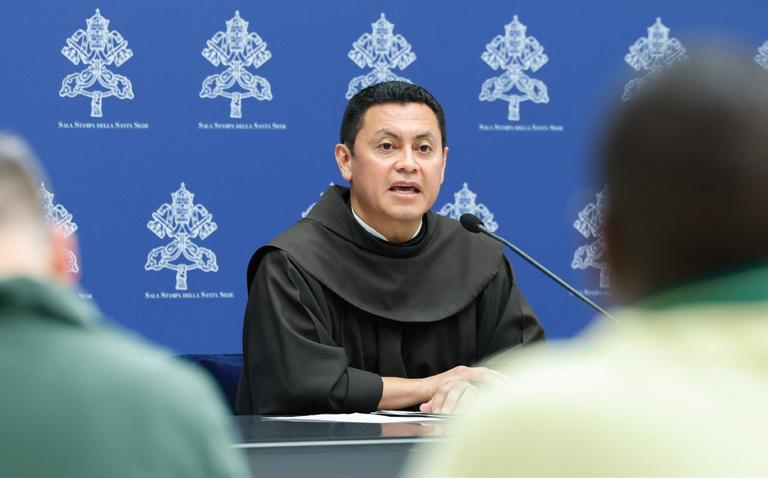
“Creation itself, like humanity, was enslaved, albeit through no fault of its own, and finds itself unable to fulfill the lasting meaning and purpose for which it was designed,” he wrote, reflecting on St. Paul’s letter. “It is subject to dissolution and death, aggravated by the human abuse of nature.”
At the same time, St. Paul saw that “the salvation of humanity in Christ is a sure hope also for creation,” which will be “set free from its bondage to decay and obtain the glorious liberty of the children of God,” he wrote.
“This conversion entails leaving
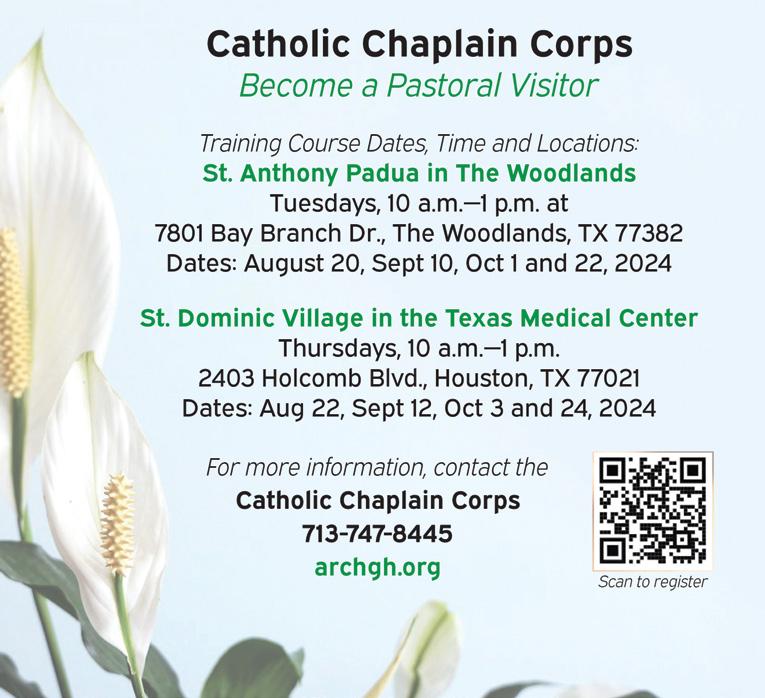
behind the arrogance of those who want to exercise dominion over others and nature itself, reducing the latter to an object to be manipulated, and instead embracing the humility of those who care for others and for all of creation,” he added.
“To hope and act with creation, then, means above all to join forces and to walk together with all men and women of goodwill,” he said in his message.
It also means rethinking the meaning and limitations of human power, which has “made impressive and awesome technological advances,” he wrote. However, “unchecked power creates monsters and then turns against us,” and there is “an urgent need to set ethical limits on the development of artificial intelligence.”
Rather than being used for domination over humanity and nature, technology must be “harnessed for the service of peace and integral development,” he wrote.
The pope’s message said Christian theology and its understanding of hope play an important role in helping people of faith make the needed “ecological conversion.”
With God as the loving Father, His Son as the “friend and redeemer of every person, and the Holy Spirit who guides our steps on the path of charity,” he wrote, “obedience to the Spirit of love radically changes the way we think: from ‘predators,’ we become ‘tillers’ of the garden.”
Presenting the pope’s message at a news conference at the Vatican June 27, Salesian Sister Alessandra Smerilli, secretary of the Dicastery for Promoting Integral Human Development, said “ecological conversion, like any conversion experience, is a spiritual event with visible, concrete repercussions.”
That is why this year’s message is “markedly theological,” she said so that it can “support this awareness that makes hope almost a miracle of God in us, but also around us” and help the faithful respond concretely to what is happening in the world.
Father Alberto Ravagnani, who works in youth ministry for the Archdiocese of Milan, said it is important to help young Catholics be able to approach ecological crises and caring for creation from a place of faith and hope, rather than fear.
“The topic of caring for creation is not always adequately brought to the attention of children and young people as a topic of faith,” that is, linking the environment with “our identity as creatures, as children, as brothers and sisters.”
Responding to a question about activists who turn to violent or harmful methods to raise awareness about climate change and related issues, he said the majority of young people are looking for positive ways to be engaged and help change things, “not by destroying …, but by shaping something new.”
That is why it is important to create real possibilities for young people to take the lead in constructive projects and even help with funding, the priest said.
Most young people are under the impression that the Church is trying to hinder technological progress or that “God is insignificant” or “unreliable,” he said.
Young people need to see that the Church questions development that threatens human dignity and creation and promotes progress that is “for the true good of humanity.” †
In a continuing effort to provide pastoral care to victims of sexual abuse by clergy or Church personnel, Daniel Cardinal DiNardo would like to remind the faithful of the Archdiocese of the availability of the Victims Assistance Coordinator. Anyone who has been the victim of sexual abuse by clergy or Church personnel is encouraged to call Diane Vines at 713-654-5799. Please keep in daily prayers the healing of victims of abuse and all who suffer in any way.
(OSV News) — Un llamado del cirujano general de EE.UU. para que se coloquen etiquetas de advertencia en las redes sociales marca “uno de los muchos pasos que deben tomarse” para reducir los riesgos del entorno digital para niños y jóvenes, dijo uno de los jefes de una campaña de salud mental lanzada por los obispos católicos del país.
En un artículo de opinión del 17 de junio para The New York Times, el Dr. Vivek H. Murthy, cirujano general de Estados Unidos, instó a la creación de avisos aprobados por el Congreso para las redes sociales, similares a los exigidos por el gobierno federal para los productos de tabaco desde 1965, diciendo que “El bienestar de nuestros hijos está en juego”.
Murthy, quien en 2021 hizo sonar la alarma sobre el estado de salud mental de los adolescentes estadounidenses, declaró que “las redes sociales están asociadas con importantes daños a la salud mental de los adolescentes”.
“Los adolescentes que pasan más de tres horas al día en las redes sociales enfrentan el doble de riesgo de sufrir síntomas de ansiedad y depresión, y el uso diario promedio en este grupo de edad, en el verano de 2023, fue de 4,8 horas”, escribió Murthy. “Además, casi la mitad de los adolescentes dicen que las redes sociales les hacen sentir peor con respecto a su cuerpo”.
El arzobispo Borys A. Gudziak de la Arqueparquía Católica Ucraniana de Filadelfia dijo a OSV News que la alerta del cirujano general debería ser bienvenida, diciendo: “Existe evidencia suficiente de que el uso incontrolado de las redes sociales puede ser perjudicial para la salud psicológica y espiritual de personas susceptibles”.
El arzobispo, que preside el Comité de Justicia Interna y Desarrollo Humano de la Conferencia de Obispos Católicos de Estados Unidos, se asoció el otoño pasado con el obispo Robert E. Barron de Winona-Rochester, Minnesota, jefe del Comité de Laicos, Matrimonio, Vida Familiar y Juventud para lanzar la Campaña Nacional Católica de Salud Mental.
Con varias organizaciones asociadas, entre ellas Caridades Católicas de EE.UU., la Asociación Católica para
la Salud, la Asociación de Ministros Católicos de Salud Mental y la Alianza Nacional Católica sobre la Discapacidad la campaña nacional está generando mayor conciencia sobre el tema, para eliminar la sensación de estigma de quienes padecen enfermedades mentales y “para defender un mensaje claro para todos: todos los que necesitan ayuda deben recibirla”.
Al mismo tiempo, “tengo pocas ilusiones de que una etiqueta de advertencia así resuelva el problema”, afirmó el arzobispo Gudziak.
“Es evidente que el desarrollo de nuestras comunicaciones, medios y tecnología de la información está avanzando más rápido que nuestra capacidad de discernir éticamente cómo utilizar mejor estas poderosas herramientas”, dijo el arzobispo Gudziak, haciendo referencia a los recientes comentarios del Papa Francisco a los líderes del G7 sobre inteligencia artificial.
“Estas herramientas, en lugar de seguir siendo meros instrumentos, pueden convertirse, y ya lo han sido, en muchos casos en mecanismos de control”, añadió el arzobispo.
El propio Murthy admitió que “una etiqueta de advertencia, por sí sola, no haría que las redes sociales fueran seguras para los jóvenes”, señalando la necesidad de una regulación federal y el cumplimiento normativo por parte de las empresas de redes sociales.
Junto con un amplio apoyo de padres, pares y líderes de salud pública, las medidas específicas que Murthy recomendó incluyen proteger a los usuarios jóvenes del acoso, el abuso, la explotación, el contenido sexual y la violencia extrema en línea.
Murthy también dijo que no se debería permitir que las plataformas recopilen datos confidenciales de niños, quienes también deberían estar protegidos de “notificaciones automáticas, reproducción automática y desplazamiento infinito, que se aprovechan de los cerebros en desarrollo y contribuyen al uso excesivo”.
Sin embargo, hacer que el mundo digital sea más seguro para niños y jóvenes es como empuñar un “espada de doble filo”, dijo a OSV News el psicólogo clínico autorizado James Black, director
DE ABUSO SEXUAL DEL CLERO
En un continuo esfuerzo por facilitar atención pastoral a las victimas de abuso sexual del clero o del personal de la Iglesia, el Cardenal DiNardo gustaría recordar a los fieles de la Arquidiócesis la disponibilidad del Coordinador de Ayuda a Víctimas. Si alguien ha sido victim de abuso sexual del clero o del personal de la Iglesia, se les anima llamar a la Diane Vines al 713-654-5799. Por favor rece por la sanación de las víctimas del abuso y por todos los que sufren de alguna manera.
de la División de Servicios Juveniles de los Servicios Sociales Católicos de la Arquidiócesis de Filadelfia.
Black destacó la advertencia de la Asociación Estadounidense de Psicología de que evaluar el verdadero impacto de las redes sociales en los jóvenes puede ser complejo, diciendo: “Por un lado, ciertamente hay aspectos positivos (de las plataformas)”, como proporcionar conexión entre los marginados o grupos físicamente distantes, junto con “desventajas”.
“Correlación no significa causalidad”, dijo Black. “¿Son las redes sociales las que causan (angustia), o hay niños con tendencia a la depresión y la ansiedad que se ven más afectados negativamente por su uso?”
Aún así, dijo Black, las redes sociales no pueden sustituir las interacciones humanas auténticas y en persona y, en cambio, pueden oscurecer la perspectiva general del usuario.
“La gente publica todas las cosas maravillosas que suceden en sus vidas en las redes sociales, y eso puede darte esta sensación distorsionada de que la vida de
todos los demás es genial: van de viaje, tienen muchos amigos, tienen todos estos hermosos autos, pero ese es un retrato muy distorsionado de la vida de la mayoría de las personas”, dijo Black. “La mayoría de las personas no publican en Facebook las luchas que están teniendo, los problemas de dinero o el hecho de que fueron despedidos de su trabajo la semana pasada”.
En la juventud, ese desequilibrio se magnifica, afirmó.
“Los jóvenes pueden ver fotografías de personas de su edad con muchos amigos o en fiestas, y luego dicen: ‘Bueno, ¿por qué no me invitaron a esa fiesta? ¿Por qué no tengo muchos amigos?... Pero quizás no sepan que la mitad de las personas en esa foto se pelearon al día siguiente porque saben que alguien dijo algo desagradable en esa fiesta”.
Black también dijo que las fuerzas del orden están “realmente en sintonía ahora con el monitoreo de las páginas de las redes sociales”, especialmente para prevenir la violencia adolescente, que puede escalar rápidamente de entornos en línea a entornos en persona. †



BY JO ANN ZUÑIGA Texas Catholic Herald
HOUSTON — Houston Catholic school students Eden Ting, whose parents are originally from Malaysia, and Carlos Martinez, with his mother from El Salvador, consider themselves “introverted” but are finding their voices through summer writing workshops.
Organized by the Catholic Literary Arts (CLA), the annual workshops take place with faculty each June for a week at the University of St. Thomas. The 2024 Fearless Catholic Writing Camp, which occurred from June 10 to 14, welcomed about 90 students in grades third through eighth.
For older students like Ting and Martinez, there is a High School Writers Institute, during that same week in June at the University of St. Thomas with about 80 students this summer, said CLA President Sarah Cortez.
“On the final day of the workshops, parents and friends are invited to a joyous celebration of each student reading his or her best writing,” Cortez said. “These are pieces that the students have revised under the instruction and guidance from our mentor-teachers.”
MOVIE RATINGS By OSV News
A-I
– SUITABLE FOR ALL
• Despicable Me 4 (PG)
• The Garfield Movie (PG)
A-II
– SUITABLE FOR OLDER CHILDREN
• IF (PG)
• Inside Out 2 (PG)
• The Watchers (PG-13)
She added, “Parents say most often, ‘I didn’t know my child could write so well!”
me the strength to overcome this trial…’”
is actually as American as can be!”

Ting, who began her education at St. Francis de Sales Catholic school, will start her freshman year at Cristo Rey. “I’m a bit nervous and would rather just listen.” Ting said, “But the workshop helped me understand how the influence of those who came before me, as well as those who now surround me, helped shape my perception of the world and my place in it.”
On the last day of the workshop, Ting read aloud her writing on “St. Lucy’s Trial,” about the fourth-century saint who was martyred after refusing to give up her faith to marry a pagan. “‘Your commitment to keep me away from my vocation — my faith — will get you punished,’” her voice trembled, but her tone was confident.
“She watched the silent rage glisten over the governor’s eyes. She bowed her head… ‘Dear Almighty God,’ she thought, squeezing her own eyes shut, ‘please give
► To read full movie reviews, visit www.osvnews.com/category/reviews
A-III – ADULTS AND ADOLESCENTS
• A Quiet Place: Day One (PG-13)
• Kingdom of the Planet of the Apes (PG-13)
• Tarot (PG-13)
L – LIMITED MATURE AUDIENCE
• Furiosa: A Mad Max Saga (R)
• The Bikeriders (R)
• The Exorcism (R)
• The Strangers: Chapter 1 (R)
O – MORALLY OFFENSIVE
• Bad Boys: Ride or Die (R)
• Hit Man (R)
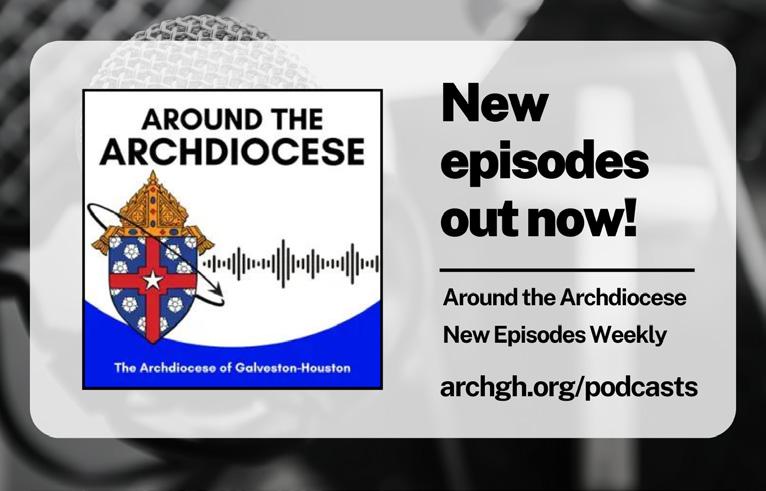
On an opposite topic, Martinez, who had participated in these writing workshops since he attended Holy Ghost Catholic School as a 12-year-old, wrote about sports. Now attending Cristo Rey as a junior this year, his chosen piece focused on his interest and psychology in playing sports entitled “Introverted Soccer Player.”
The teen, who plays both soccer and basketball, wrote, “Every weekend, as the sky begins to get darker and light begins to emit from the tall poles, there’s always a feeling as if I am getting punched in the stomach.”

His excerpt continues, “I hear my father call out to me, telling me that it’s time to head to the park, which I have no problem with, but there’s always a feeling of anxiety and my nerves starting to act up.”
The diversity of students participating in the workshops may have their religion in common but are at different transitions in culture. Both of Ting’s parents moved from Malaysia to the U.S. when they were younger with their own families in the 1980s. But Ting herself and her little brother were born in Houston.
Ting’s mother, Edith, said, “Aside from some traditions we still observe, like Chinese New Year and other holidays with traditional foods and recipes, Eden
“She barely speaks Chinese and definitely no Malay. So her writings have not reflected this particular legacy,” said her mother, who works as a program manager for an electronic manufacturer of circuit boards.
Martinez’s mother, Heizel Rivera, said her son has explored their Latin American roots in his writing. “My family is from El Salvador, a village named Barrancones. My son has gone two times to visit his grandparents and family. He wrote about how they live off fishing and how they managed to enjoy life to its fullest, always sticking together,” she said.
Carlos Martinez said the workshops “have helped me socially and academically because they have made me more confident in myself and helped me more in my classes like English and World History.”
Cortez, who oversees the workshops, explained the summer classes have four components to study poetry, fiction, personal essay and sacred story.
“In each genre, they work with mentors to identify skills and writing strategies. Then, after instruction and discussion, the students are assigned to use these styles and skills in their writing,” she said.
For more information on the annual summer workshops and other events that CLA organizes, including an annual middle school sacred poetry contest, visit CatholicLiteraryArts.org. †
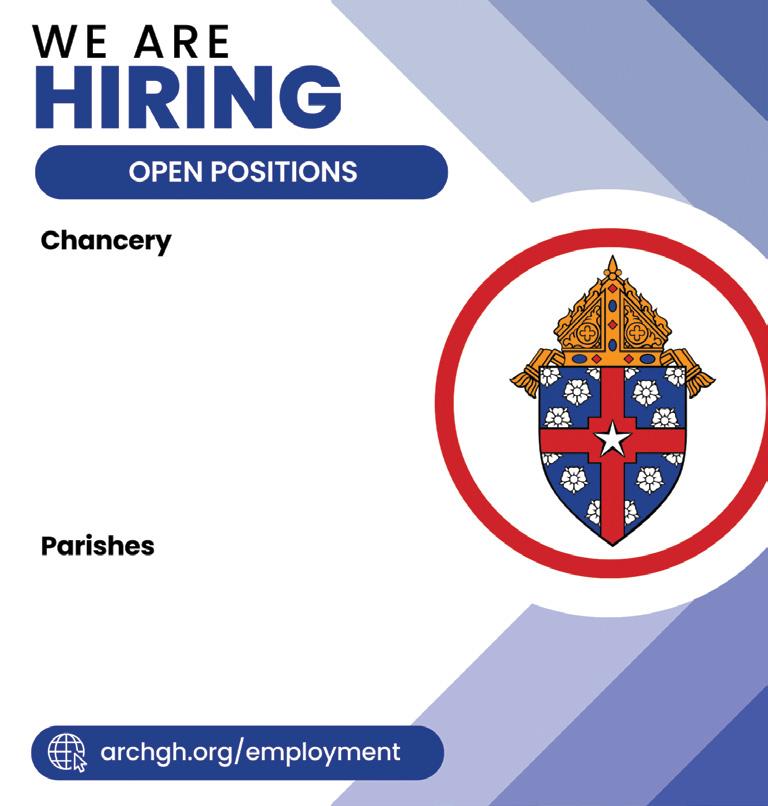
► FOR SUBMISSION DETAILS AND MORE LISTINGS, VISIT WWW.ARCHGH.ORG/ATA.
JULY 9-11
CONFERENCE, 10 a.m. to 2 p.m. each day, Emmaus Spirituality Center (12211 Memorial Dr., Houston). “SDI Summer Institute: Deepening Our Presence As Spiritual Directors,” features six presenters focused on spiritual direction topics including “God’s Revelation Continues,” “Culture’s Hidden Voice Challenges Faith” and “The Use of Scripture in Spiritual Direction.” Cost: $50 per day or $125 for all three days; two sessions plus lunch daily. info@ emmausspiritualitycenter.com; 281-241-9678.
JULY 12-14
SILENT RETREAT, Friday 6 p.m. to Sunday 12:30 p.m., Holy Name Passionist Retreat Center (430 Bunker Hill Rd., Houston). Three-day retreat with Father Elmer Herrera-Guzman includes Mass, Reconciliation, conferences and prayer. Parish groups, couples and individuals are welcome. $265. 713-464-0211 ext. 10; holynameretreatcenter.com.
JULY 13
SUMMER SPEAKER SERIES, 7 to 9 p.m., Lone Star Flight Museum (11551 Aerospace Ave., Houston). Features GRN radio talk show hosts Debbie Georgianni and Adam Blai of the Spirit
World, includes Q&A on angels and demons and how the spiritual and physical worlds interact. Cost: $45, includes food and drink. grnonline. com.
JULY 18-20
GARAGE SALE , St. Elizabeth Ann Seton Catholic Church (6646 Addicks Satsuma Rd., Houston). July 18, 10 a.m. to 8 p.m., $10 entry; July 19, 8 a.m. to 5 p.m., free entry; and July 20, 8 to 11 a.m., is 50% off, and noon to 3 p.m. is fill a bag/box. seascatholic.org.
JULY 20
FUNDRAISER, 6:30 p.m., Holy Family Church (1510 5th St., Missouri City). Black Catholic Ministry Group Summer Dance includes music, dancing, food for sale and raffle. gloriareed2014@comcast.net.
JULY 25
FOOD FEST, 5 to 7:30 p.m., KC Hall (2320 Hatfield Rd., Pearland). St. Luke the Evangelist in Houston hosts a food fest. Come and sample food from local eateries and enjoy DJ Music and fellowship. stlukescatholic.com
JULY 25-27
GARAGE SALE, St. Theresa Community Center (705 St. Theresa Blvd., Sugar Land). Thursday, July 25, from 6 to 9 p.m., Friday, July 26, from

9 a.m. to 7 p.m., and Saturday, July 27, from 9 a.m. to noon. Items for sale include adult and children’s clothing, shoes, toys, household items, linens, knick knacks, furniture, holiday and miscellaneous items. 281-507-1350.
JULY 26-28
MARRIED COUPLES RETREAT, Friday 6 p.m. to Sunday 12:30 p.m., Holy Name Passionist Retreat Center (430 Bunker Hill Rd., Houston). This three-day retreat, “Love on Flames,” with retreat master Father Kingsley Nwoko, STL. Married couples welcome. Cost: $430 per couple registration fee includes lodging, meals and materials. 713-464-0211 ext. 10; holynameretreatcenter.com.
JULY 27
FUNDRAISER, 6 to 10 p.m., Alvin KC Hall (129 CR 146, Alvin). Catholic Daughters of the Americas, St. John the Baptist Court #2073 in Alvin hosts “Denim & Diamonds Dinner and Dance Fundraiser,” with barbecue baked potato dinner, dance, raffle, silent auction, 50/50 raffle and games. Cost: $15 pre-sale or $20 at door; raffle tickets $10 for 1 or $25 for 3; game prices vary.
AUGUST 6
SUMMER SERIES, 9:30 to 11:30 a.m., every Tuesday in August, Emmaus Spirituality Center (12211 Memorial Dr., Houston). “The
Enneagram for Everyday” is a summer series for those already familiar with the Enneagram featuring discussions, presentations and personal reflection. $45 per session or $160 for all four sessions. info@ emmausspiritualitycenter.com; 281-241-9678.
AUGUST 7
VOCATIONS HOLY HOUR, 7 to 8 p.m., Sacred Heart (507 S 4th St. Richmond). A Vocations Adoration Holy Hour held every first Wednesday of the month, includes Sacraments of Reconciliation and Anointing of the Sick. sacredhrt.com/adoration.
AUGUST 24
ANNIVERSARY DINNER, 6:30 p.m., St. John the Evangelist (800 W Baker Rd., Baytown). 50-year anniversary dinner celebration of the founding of St. John parish that begins two-fold fundraiser to plan for future. Cost: $100 per ticket, table purchase available. www.facebook. com/stjohnbaytown/events.
For additional listings, visit WWW.ARCHGH.ORG/ATA
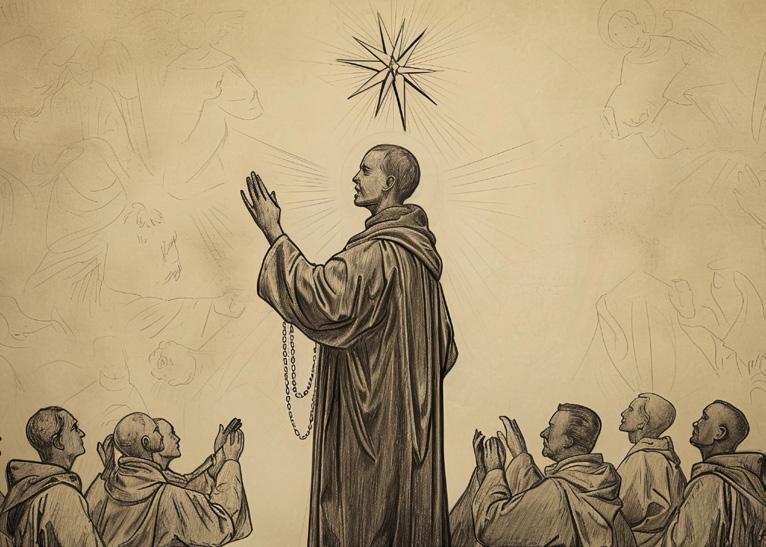


Debra Haney caps off three decades of service to Catholic education
HOUSTON — After more than 30 years in education as a teacher, principal, and culminating as Catholic Schools superintendent, Debra Haney, Ed.D., resigned from her position with the Archdiocese of Galveston-Houston at the end of June to relocate with her family.
Auxiliary Bishop Italo Dell’Oro, upon making the announcement, said, “We ask your prayers for Dr. Haney and her family as they prepare for this important phase in their lives.”
She and her husband, Jason, are moving to the College Station area, where they will build their new home.
When asked what she would consider her legacy in education, Haney pointed to coordinating the overall curriculum to interconnect all subjects whether it be
science, religion, art, math, and other areas now known as STREAM.
“We have seen improvements in our students’ overall growth scores on our assessments, and we have seen a greater commitment to learning in our students as STREAM makes learning fun, relevant and meaningful to them,” Haney said.“STREAM allows for students to practice the skills of collaboration, communication, cooperation, critical thinking and problem-solving that are needed in today’s society and are applicable to daily living and future career success.”
In January, Dr. Mazie McCoy was named superintendent of Catholic Schools for the Archdiocese, effective July 1. McCoy has more than 21 years of experience in Catholic education, including as principal and over the past two years as assistant superintendent of Governance and Leadership, overseeing the formation of principals, preparing those aspiring to be leaders, and assisting school pastors and local advisory school councils. †
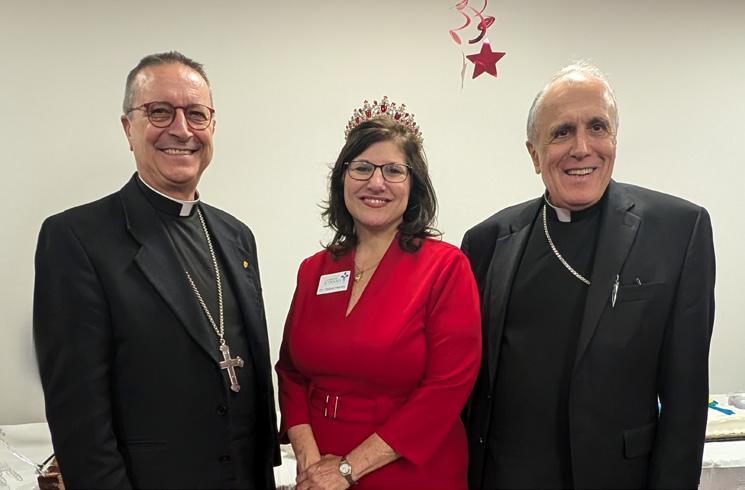






Catholic Cemeteries
